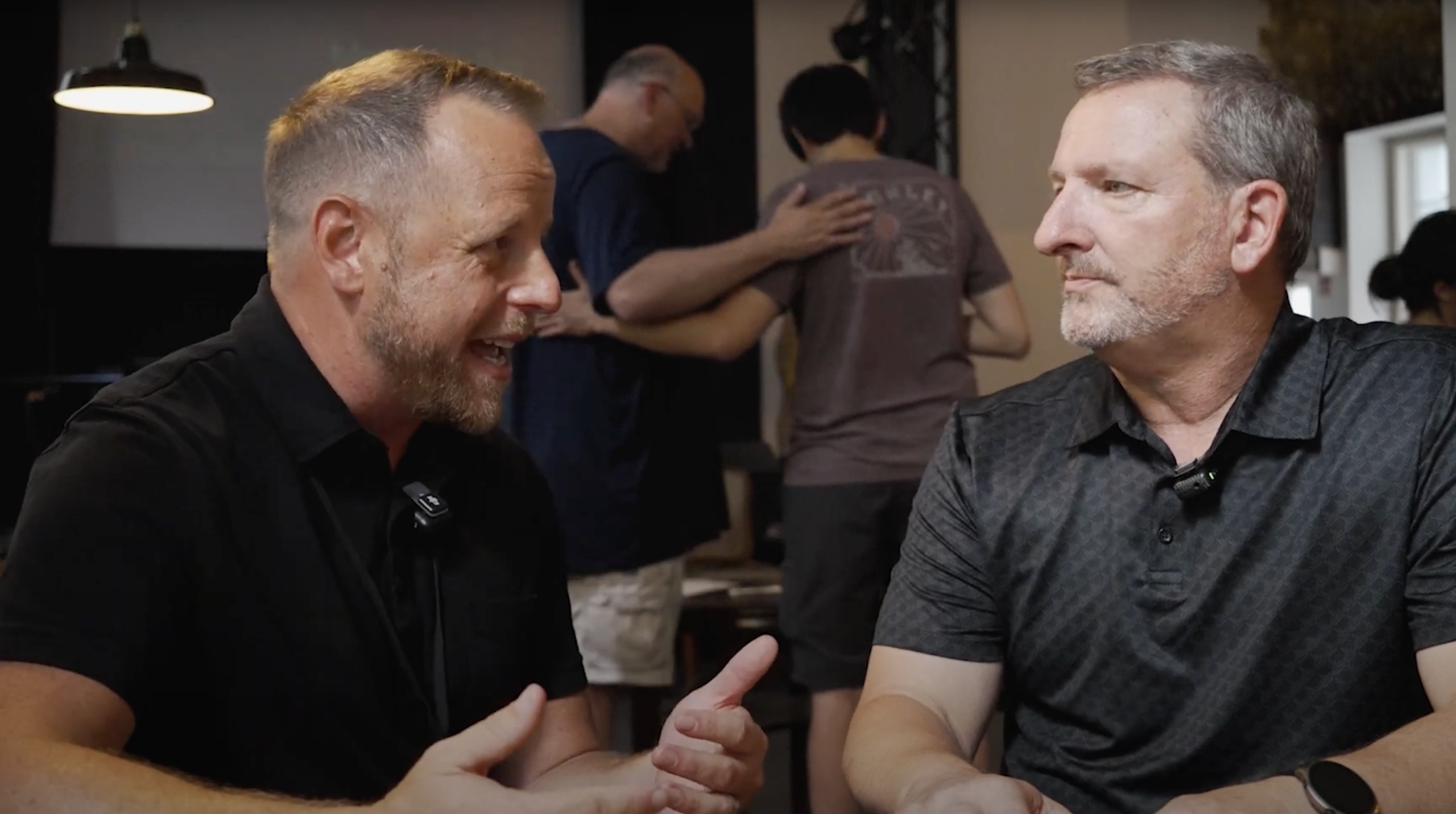
Matt Geppert with Ken Cramer at Friends Around the Table Berlin 2024
See Matt Geppert talk with Ken Cramer at Friends Around the Table Berlin 2024.
Matt Geppert with Ken Cramer at Friends Around the Table Berlin 2024
See Matt Geppert talk with Ken Cramer at Friends Around the Table Berlin 2024.
Three days of powerful, spirit-led preaching. Of soulful, energetic worship. Of prayer walking the city of Berlin in unity. It was an incredible week! This is what Friends Around the Table was meant to be.
Thank you, friends, for joining us.
PARTNER TODAY
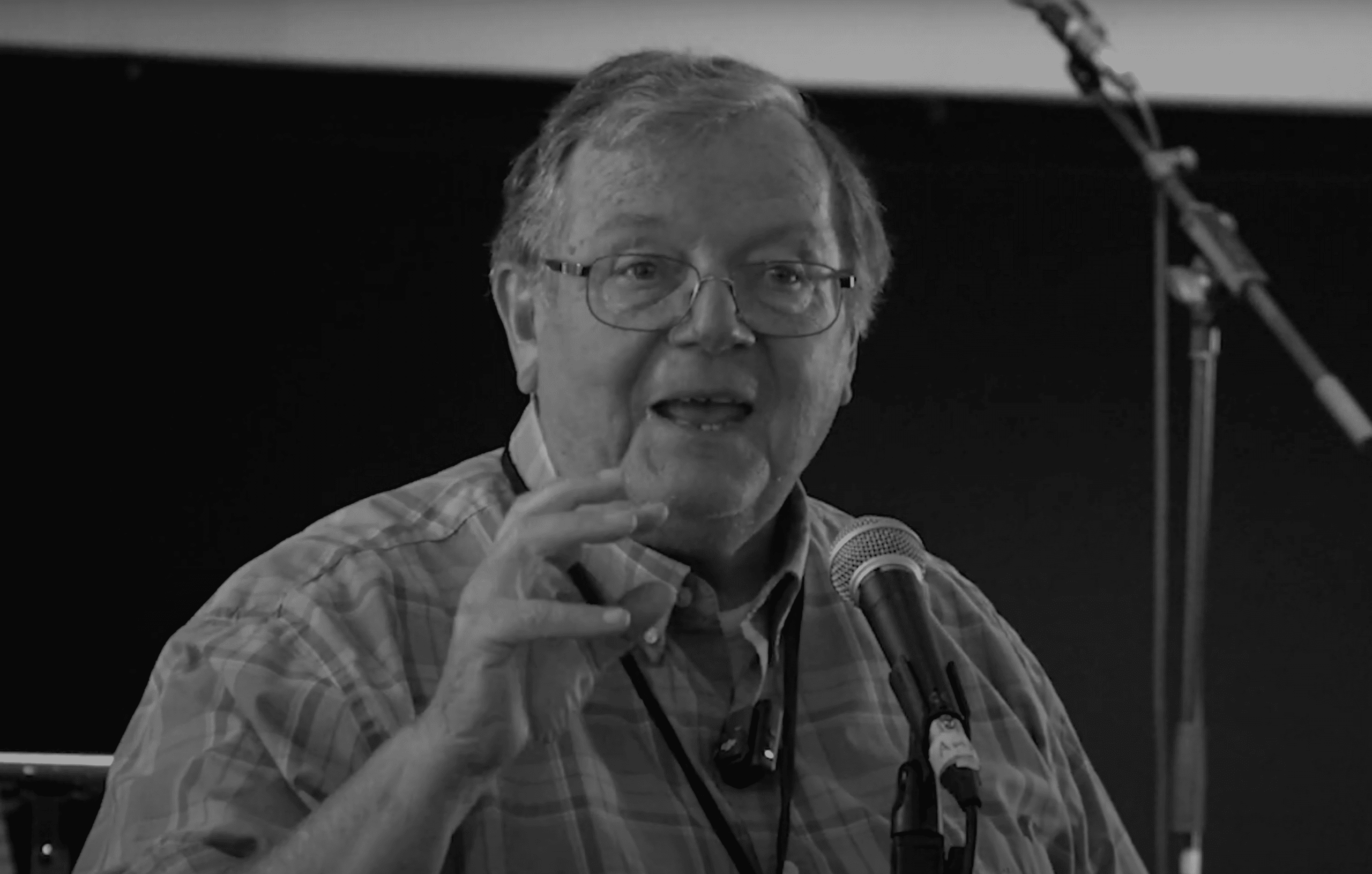
Friends Around The Table - Berlin 2024
Three days of powerful, spirit-led preaching. Of soulful, energitic worship. Of prayer walking the city of Berlin in unity. It was an incredible week! This is what Friends Around the Table was meant to be.
Friends Around The Table - Berlin 2024
Three days of powerful, spirit-led preaching. Of soulful, energetic worship. Of prayer walking the city of Berlin in unity. It was an incredible week! This is what Friends Around the Table was meant to be.
Thank you, friends, for joining us.
PARTNER TODAY
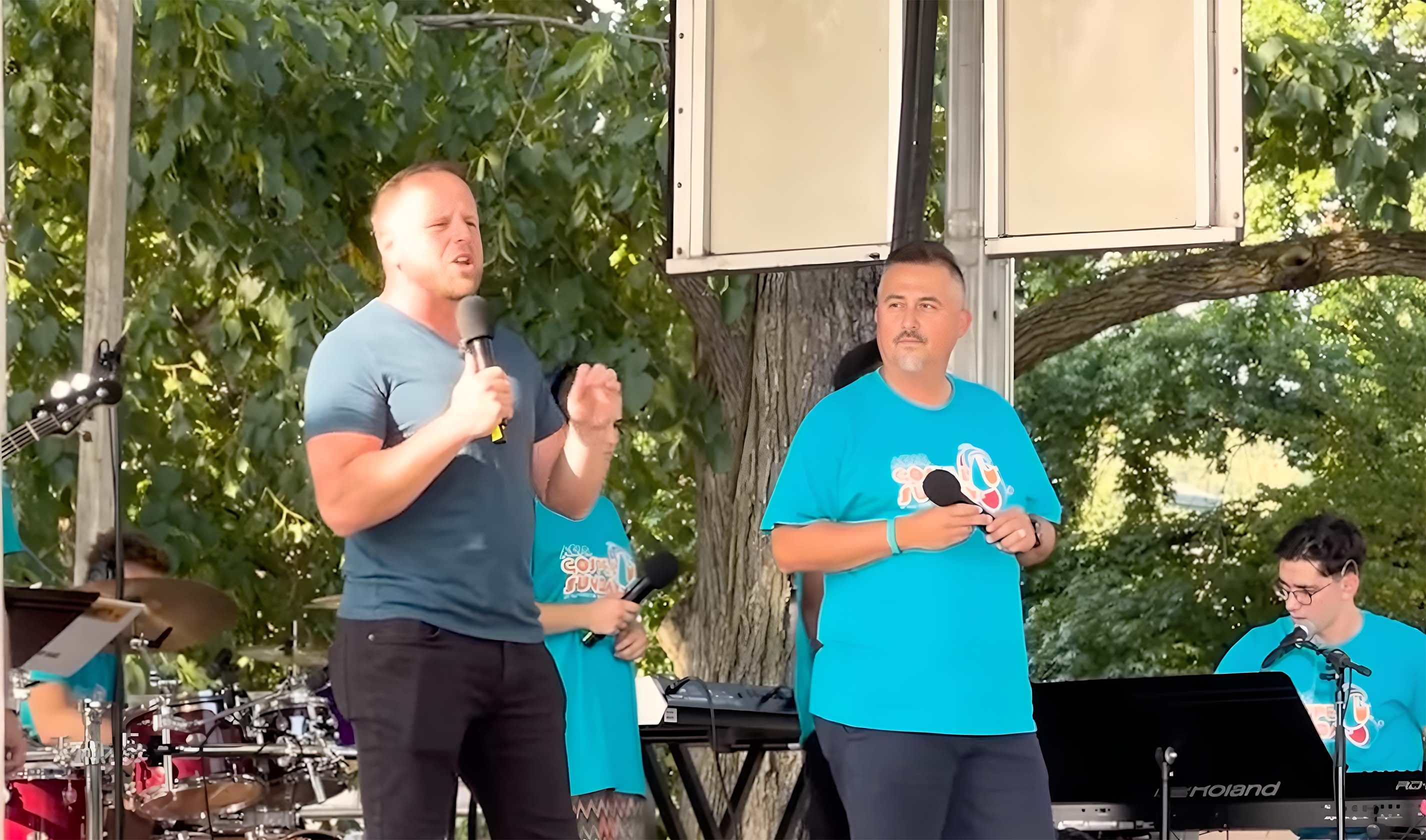
Matt Geppert Opens Prayer and Worship at Allegheny Commons Park
They eyes of the nations are focused on western PA this week. How will we respond? Pittsburgh responded on Sunday by lifting the name of Jesus in prayer and worship at Allegheny Commons Park. Matt Geppert opened the evening in prayer, followed by moving music and Spirit led unity for over two hours.
Matt Geppert Opens Prayer and Worship at Allegheny Commons Park
They eyes of the nations are focused on western PA this week. How will we respond?
Pittsburgh responded on Sunday by lifting the name of Jesus in prayer and worship at Allegheny Commons Park. Matt Geppert opened the evening in prayer, followed by moving music and Spirit led unity for over two hours.
PARTNER TODAY
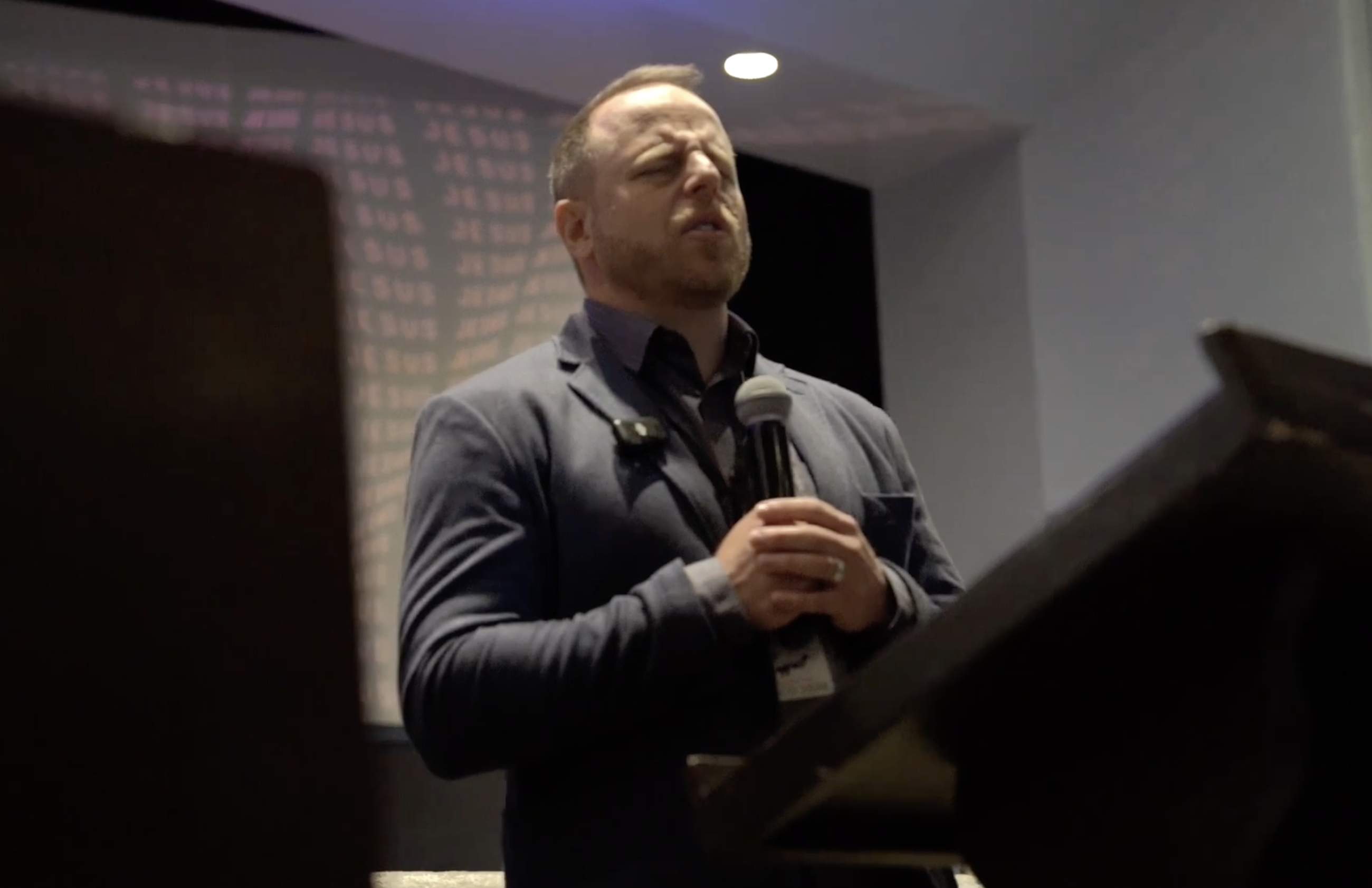
An Update from Matt Geppert - Friends Around the Table Americas 2024
An Update from Matt Geppert - Friends Around the Table Americas 2024
An Update from Matt Geppert - Friends Around the Table Americas 2024
PARTNER TODAY

Part 1 - An SEAPC Podcast with Benjamin Chua and Jared Lenhart
In this podcast episode, Benjamin Chua [SEAPC UK] had an opportunity to sit down with Jared Lenhart [Frontier Harvest Ministries] and discuss Jared's family history in missions---specifically in Burma (now known as Myanmar).
Part 1 - An SEAPC Podcast with Benjamin Chua and Jared Lenhart
This podcast episode, Benjamin Chua [SEAPC UK] had an opportunity to sit down with Jared Lenhart [Frontier Harvest Ministries] and discuss Jared's family history in missions---specifically in Burma (now known as Myanmar). Jared's passion for missionaries, for the Lord, and for the people of Southeast Asia is evident throughout the podcast. We hope you enjoy! Learn more about Jared's ministry at https://www.frontierharvest.com/
PARTNER TODAY
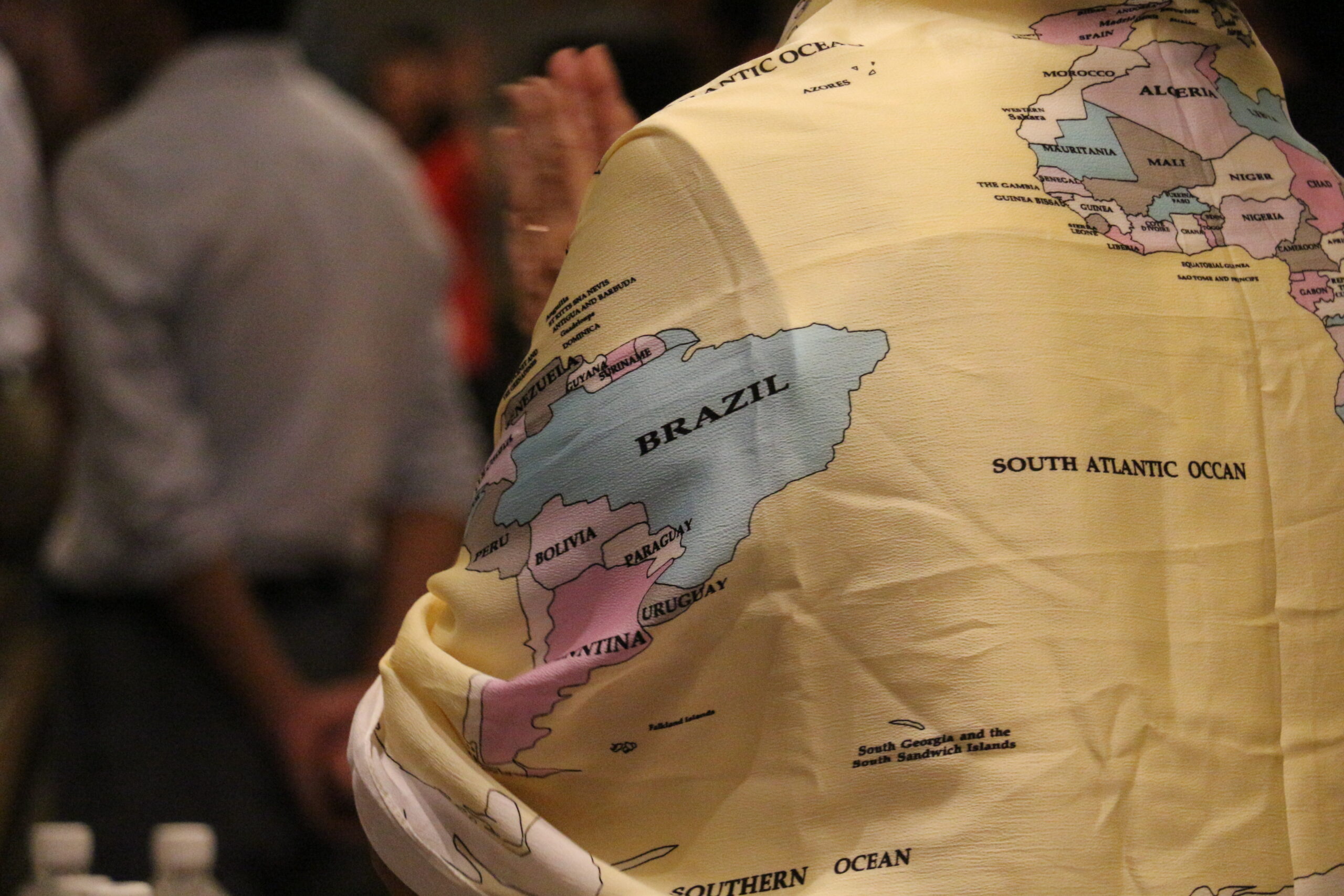
Connecting the Whole World (4 FATTs, 1 Epic God Story)
by Junia*, an SEAPC Missionary Partner
Table of Contents
Literally every single Friends Around the Table (FATT) I have been to has come with massive travel obstacles. Everything from getting sick just before, to bank accounts being hacked… crazy things. On the way to Jerusalem in 2019, I got stuck in an Indian airport for 36 hours, so that trip was no exception. Prior to that trip, some of my friends at SEAPC had told me, “There’s a person we really want you to meet…” So they put us in a room together in Jerusalem; that’s how I met Janet,* who is now a key ministry partner, for the first time.
*Names changed for security reasons in a sensitive mission context.
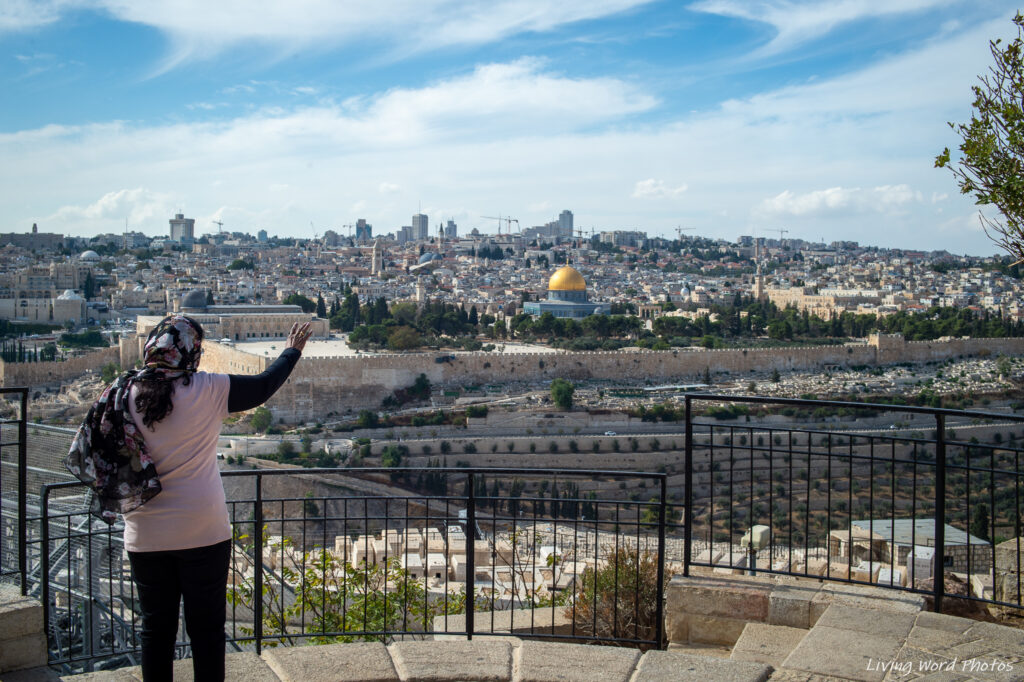
Holistic Connections in the Holy City
(FATT Jerusalem, 2019)
The first night we were there, we went out to dinner together, got talking, and realized that, as missionaries operating with the same professional background (through our ‘tent-making’), we were very much on the same page in our approach to sharing the Gospel. It turned out that a long-time program Janet had created was very similar to the one I was teaching in the country I had been sent to. That’s not a normal thing in our profession (seeing the specific kind of work we do as a global mission, and as a unique way to reach people).
At the time, Janet had done a lot of her work through a major global missions NGO; she basically started an entirely new way to serve and reach people through her program. She had also founded a small non-profit of her own, and was wondering: what does it look like to start training up the next generation, after several decades working in this field? She realized that one of the people she was working with at the time would not be that person, even though she had initially thought they would be. And then we met in Israel…
During one of the workshops at Friends Around the Table, we identified what our God-given life purpose was in the form of two catch-all words. Mine were: “pioneering freedom.” Independently, Janet picked the exact same words. Throughout the rest of our time in Israel, we saw how similarly we were wired, and how much our callings overlapped. Now, God had spoken these two words to me years before, so to find someone else in the same space — someone who had been doing this for years — was such a huge encouragement. I’ve even said multiple times since Israel: Janet is who I want to be when I’m older!
Before we parted ways, we started talking about a plan: it was obvious I was the person she was looking for. That’s why I went back to the country I was stationed in that year and started telling people — my parents, my friends — “I’m going to start working with Janet and running her program all over the place…” One of those places could even be the country I was in, which happened to be a place Janet had felt called to for a while. We started what would be a complicated visa process for her and made a plan for 2020, including next steps for other countries. Obviously, all of that fell apart…
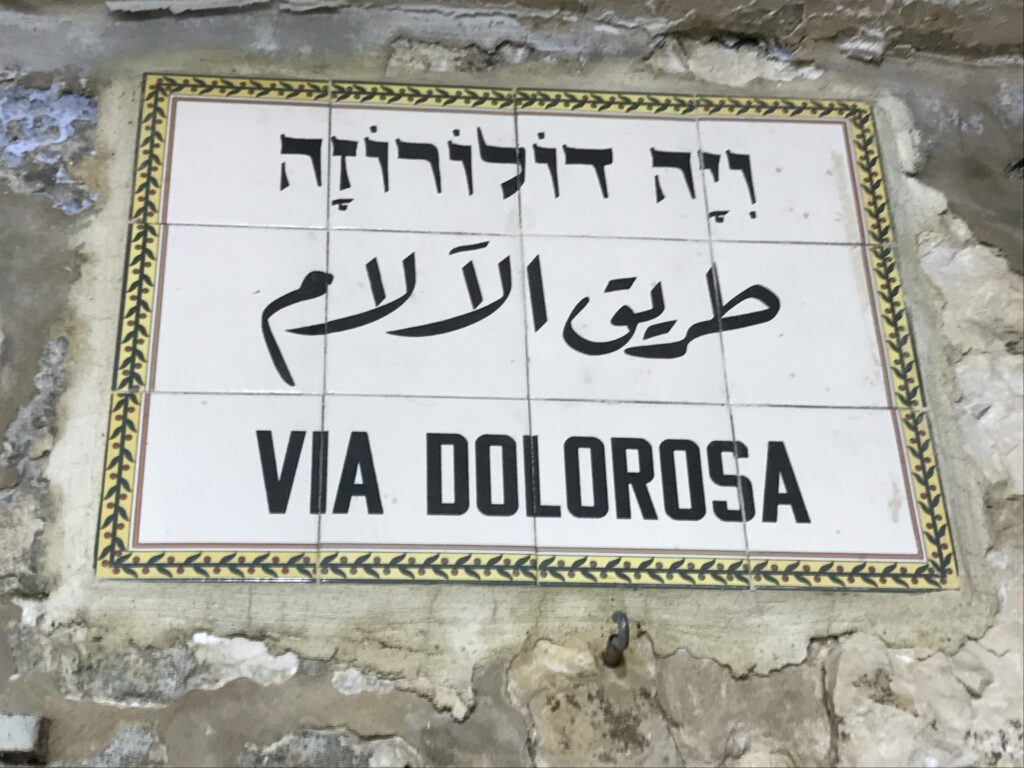
Health Challenges & Confusing Promises
(FATT Asia, Nong Khai, 2022)
2020 to 2022 were really hard years for me both because of the health issues I started struggling with and the global pandemic, which severely limited my access to medical support. During that time, Janet and I corresponded every once in a while, but to be honest we didn’t stay in super close contact. It was also clear that I was supposed to stay in the country I had been called to until my work there was finished: it was a unique, rare opening for the Gospel and I couldn’t just up and leave for something else.
I did make one trip out to Thailand in November 2022, for FATT Asia that year. One night during that gathering, I sat down with a table of people from Mongolia. We had a great dinner. The conversation I remember the most was with a Taiwanese man working in that country, who shared my conviction that the people you work with professionally are your mission field; you could be the best person to reach them. We connected on Facebook, but not much happened after that.
Fast forward to January 2023, when I finally left where I was stationed for a year of medical leave in Thailand. I was broken, sick, and at the end of my rope. And yet, just before, God started speaking to me about Mongolia. I wasn’t ready to hear any of that. I told God, “If this is you, and this is something I need to hold in my heart, I need some really specific confirmation because I just don’t have the capacity right now.” Within 24 hours, the Taiwanese man I had met in Nong Khai sent me a message to say, “Hey, I’ve been thinking… can we talk a bit about what it would be like for some of my Mongolian friends to get to the country you’ve been sent to?” Could that really be a coincidence?
Fast forward again to September 2023, when I visited Mongolia for two weeks, through that local connection. I went there to figure out: what am I being called to here? Several things seemed to be coming together through prayer walking, local connections, and a potential tent-making opportunity that fit perfectly with my experience. The issue was: in 2019, God clearly asked me to work with Janet — how could that fit with Mongolia? They felt like two very separate paths. There was an urgency, too, with Janet’s age. When the two of us finally got on the phone, I could feel the tension around this unresolved question.
I came back to the US straight after that trip to Mongolia, and I had a tentative path laid out: I would stay in the US until August 2024, and then return to Mongolia to study the local language while I prepared for the new business-as-mission opportunity there. The exact role was still being figured out by my potential employers, so they wouldn’t need me to work full-time for the first year, which meant I could study and get used to the country.
A couple of months later, in November 2023, Janet and I reconnected. I happened to be driving by Virginia, and she was in the US for once, so we planned to meet in person for the first time since Israel in 2019. Janet doesn’t have a house: she gave it up for her international work. When she’s in the US, she usually stays with family or people from her church community, which is spread out across the entire country, so you never know exactly where she’s going to be. Thankfully, this time, she was in Virginia, and she got permission for me to stay with her in her friend’s home.
The first night I was there, we had a conversation with another friend her host had invited over, someone who was interested in missions. We got talking about how we met, and Janet recounted some of the crazy things that happened in Israel, which I had forgotten. It stirred something in me: “Remember! This is really important!” It had been so long since I felt that, but I knew God was in it. I still didn’t know how to make sense of it with everything that could be happening in Mongolia.
I left Virginia thinking: “What if it’s both/and instead of either/or?” Before I left, I asked Janet, “Can we still move forward somehow?” And she said, “Of course! I have a big trip coming up that I would love you to join me on.” She was leaving the US in the middle of February 2024, and wouldn’t be back until mid-April. She asked me to join her in the Comoros* for the first part of her trip…
*Details changed for security reasons in a sensitive mission context.
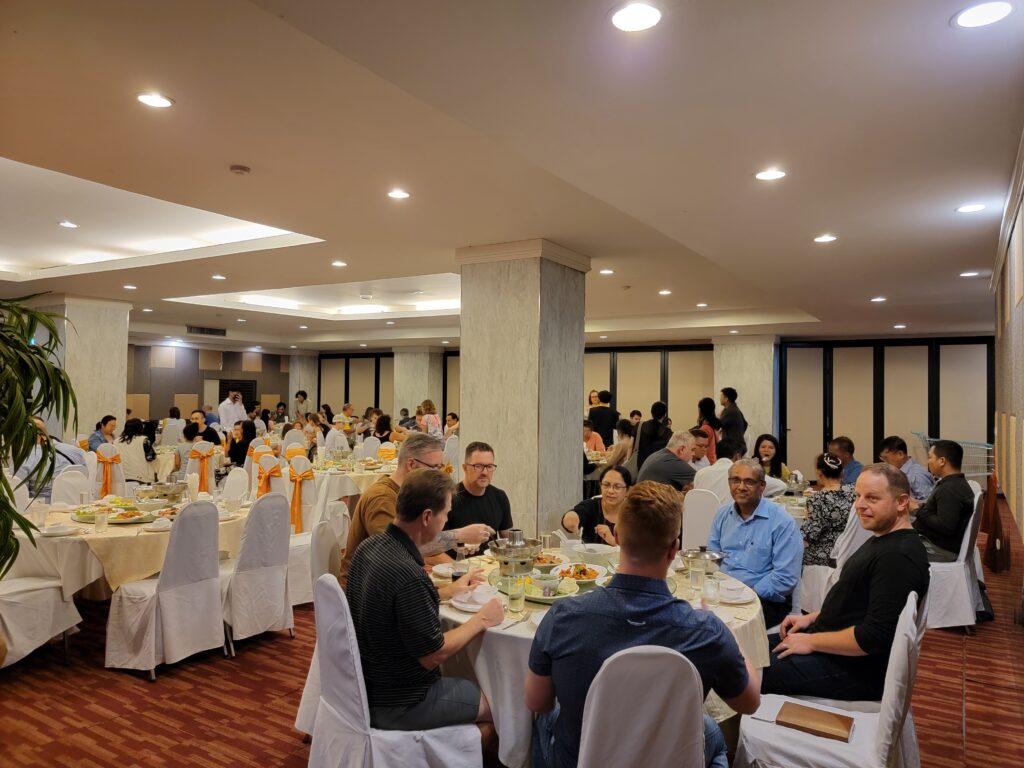
Everything, Everywhere, All At Once
(FATT Asia, Singapore, 2024)
The beginning of this year was a whirlwind in a good but also tough way. The week before Christmas, in 2023, I reached out to supporters to help with two trips scheduled for the start of 2024: first to FATT Singapore, in January, and then to the Comoros, at the beginning of February. Everything came together, but I got very sick while traveling to Singapore via Bangkok, and this delayed my arrival at FATT. I didn’t feel better until a few days before I was due to leave for the Comoros.
Still, I was excited for the first trip Janet and I would embark on together. We landed in the Comoros on a Saturday night, joining Oscar* and Lydia,* who rounded out the team. Lydia is South African, and Oscar lives in South Africa, but is a missionary from another African country. Oscar attended FATT South Africa in 2022, and that’s how he met Joshua,* our local contact in the Comoros. Oscar introduced Joshua to Janet in 2023, at the next FATT Africa. Joshua is a community leader in the Comoros; he was our big local connection. It was so cool to see how all of these people came together because of FATT. We sent Matt Geppert a group selfie to commemorate the moment.
Heading into this first training workshop with Janet and the team, I thought I was just going to be a participant, but it turns out I got to run with some of the material as a teaching consultant too. Janet prepped me by talking about the importance of keeping things very simple for the audience we were presenting to, which was a little different from the highly technical level I had been functioning at as a licensed professional in other countries.
Thirty-five participants showed up for the 40-hour training program, which was spread out over five days. Throughout the week, we found out that many of them were part of Joshua’s wider family. Even more strikingly, we found out that Joshua wanted this to be a completely open workshop, i.e. not just for those who were ‘born again’. This was not historically common in the Comoros: when resources come in, people tend to keep them for their ethnic and religious group only. Given that 98% of the Comoros is Muslim, this was a big deal. The only requirement was that participants needed to speak English because we weren’t using a translator.
On the first morning, as people casually trickled in on “African time,” four or five Muslim women showed up, as well as three Catholic nuns. The differences could not have been more obvious, and the resulting tension in the room was palpable; we couldn’t even get people to engage in small talk. At the end of the day, somebody commented, “These groups of people won’t typically share a room. It’s astonishing that they stayed together for a whole day.”
By the end of the week, you could see new, miraculous friendships had been born. On the final day, Simon,* Joshua’s brother, who owns a travel company, stood up in front of the group to say, “This marks the day of something different for our island country. Give us five years, and we will not be the same. This will not be a space of separation any longer, like it has been in the past. Now that we have the same skills, we need to work together to help our community, regardless of our individual beliefs.” It was crazy to see people talking like that after just five days of training — to hear them talk about a different direction for their community because they understood a few key things differently, and because of the unity that came out of that room.
*Names changed for security reasons in a sensitive mission context.

Hope for Each Day
Apparently, in Janet’s experience, that level of community change after a training workshop wasn’t unique to this location. I found that shocking enough, but I was even more blown away by some of the individual stories. I hadn’t come into the workshop with loads of expectations, partly because it was so new: I hadn’t even read through the whole workshop training booklet yet (I mainly looked at the sessions I was going to be consulting on).
My favorite individual story — the one I was most intertwined with — was with a woman called Hope.* Hope is a mother of two: she has a toddler and a nine-month old. She consistently arrived early, every day of the workshop. I think it was the third morning that I asked her, “Hey, what do you think of all this so far?” She told me that, the day before (a Tuesday evening), she decided to take some of the skills from her homework assignment and apply them to her family; specifically, to her toddler. The assignment was about the power of intentionality and focusing on others and, because Hope had been struggling with postpartum depression, this was a unique challenge for her to overcome with her kids.
Strangely enough, that Wednesday, I was scheduled to facilitate a session on different “blockers” that can stop us from being fully present in our work, with our colleagues, and in our lives more generally. In that session, Hope shared her personal situation with the group as learning example: after they were first married, Hope’s husband started drinking, smoking, and sleeping around, and even moved off the island, to the mainland, for work. As a result, their marriage was a mess, and all of these factors became huge blockers in Hope’s professional life. She sought help from her parents, who moved in to help take care of her kids. Hope’s kids connected really well with her mom, which bothered her, but because she had so many other things to deal with, she didn’t feel like she could do anything — until she spontaneously applied the workshop assignment to her family situation, and to her toddler in particular.
She recounted to the group how, the night of the assignment, she stopped what she was doing to give him all her attention; she played with him for hours. She was surprised and touched to see just how well he responded to her when she did. He was so excited to spend time with his mom singing, laughing and generally hanging out. She realized: “If I keep giving him this kind of intentional attention, he’s going to respond differently to me more of the time, and I might feel different in other parts of my life too.” All of this came from one small activity.
On Thursday morning, I caught up with Hope again. It turns out her husband had reached out to her on Wednesday night, after the training for that day had finished. Creatively applying some of the things she had learned, she realized there were some crossover problems in her marriage that she needed to own. So when her husband contacted her that evening, she chose to apply the training and respond differently… and that conversation led to him asking if he could come meet her in person the next day, on the island. For the first time since their marriage had broken down, she said yes.
One of my jobs for the training workshop was to videotape some of the participants’ testimonials, and I had asked Hope if she would be willing to go on camera the day before. So, when we were about to film on Thursday, she had an opportunity to share one-on-one that she was feeling anxious about meeting her husband later that day. I listened and then prayed with her.
The next time I saw her, just before the workshop started on Friday morning, she told me how she had worked up the courage to lay out specific agreements with her husband about what it would take to reconcile and, amazingly, he acquiesced to all of them. They both knew that it wasn’t time for him to move back in as if everything was normal, but it was the first time they were able to have a conversation like that. She was very encouraged.
There were other surprising stories of individual change too — more than I am able to share here. Just thinking about the ripple effect on their lives, their work, and on the people around them: all of that allows me to step back and believe that the Comoros really will be a different place in five years. Especially when you consider there were four or five community and business leaders in the room: how would this impact the people they were responsible for? Whole communities could look different because one person came away with a different understanding.
*Name changed for security reasons in a sensitive mission context.
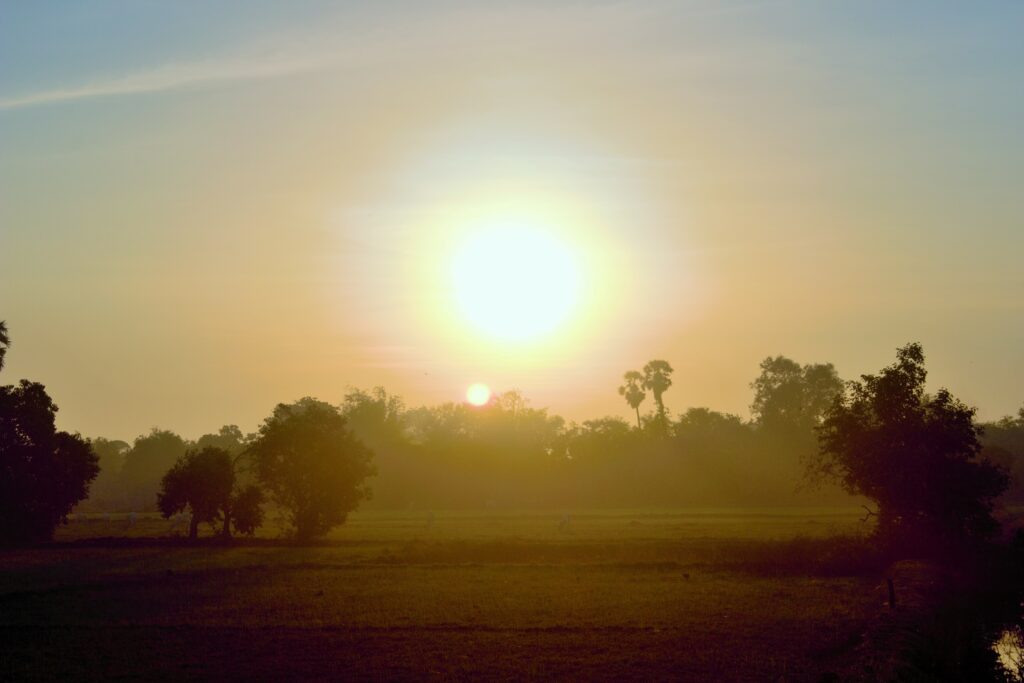
Changing the World through the Church
(FATT Africa, Kampala, 2024)
The space I’ve been in since that trip to the Comoros is figuring out how everything God has opened up since Israel fits together. It’s been clear to me that there is a unique opening for the kind of tent-making mission work I am part of, and the way the pandemic has opened up unique opportunities to teach and consult on it in unreached and closed-access countries. I’ve also always known that my calling goes beyond any one country…
In April, I started a PhD — something I have been thinking and praying about for a long time. It’s a global online program where 60% of the students live outside of the US. Through my first class, on ‘organizational innovation’, and the books I picked to review, I’ve been able to read some of the most cutting-edge research in my tent-making field, especially around technology and ‘systemic process’.
For instance, there’s an innovative AI model where one licensed professional can remotely oversee a larger group of coaches who are not licensed professionals. These coaches are trained to use an AI interface with their clients to provide on-the-ground support. This model could greatly broaden the scope of what is possible in our profession, with far fewer licensed professionals needed in a given locale.
Although I can’t go into great detail about it due to the sensitive nature of my work, I can tell you about my conviction the Church can and should play a major role in solving the main global problems in my field of study. This is based on all the research about what is effective in low- and middle-income countries: the literature has repeatedly shown that things like community-based initiatives and lay involvement are really effective solutions in these contexts. If that’s true, then who could be better to take that on than the Church, empowered by the kind of technology I mentioned above?
This June, I was blessed to be able to go to Uganda for another FATT, where I got to talk with a South African pastor, Gerhard, about an app he was involved with developing, and how that could play a role in some of the stuff I’m researching. He started sharing a vision similar to mine before I even said anything. As we got talking further, it was so easy to see how we could take the content of Janet’s training progam and reorganize it for an app platform, and then implement it in the kind of settings I’ve been reading about.
Instead of leaving the Church out of these kinds of discussions — which doesn't make any sense to me, given the research — why don’t we merge the technology available with the heart the Church has to see people healed and living in freedom? That’s what has captivated me in this time, and it is the reason I have closed the door to going to Mongolia full-time in August. I’m planning to stay in the US, where I can work with leading programs to see this kind of project come to life: to gather a multidisciplinary team of people who have the same heart for this field, and who are working in AI.
As for me and Janet, we’re still planning to run a bunch of live training workshops together: first in southern Africa in November, then in East Africa next February, and finally in a closed country in southeast Asia in May/June of next year. And, of course, we’ll be sowing back in where it all began, with another workshop that will be integrated into FATT Asia 2025 in… Mongolia. I guess God has a way of putting the puzzle pieces together, after all.
His intent was that now, through the church, the manifold wisdom of God should be made known to the rulers and authorities in the heavenly realms, according to his eternal purpose that he accomplished in Christ Jesus our Lord. Ephesians 3:10-11

Special Needs in the Church: A Hidden Mystery (30 Years in the Making)
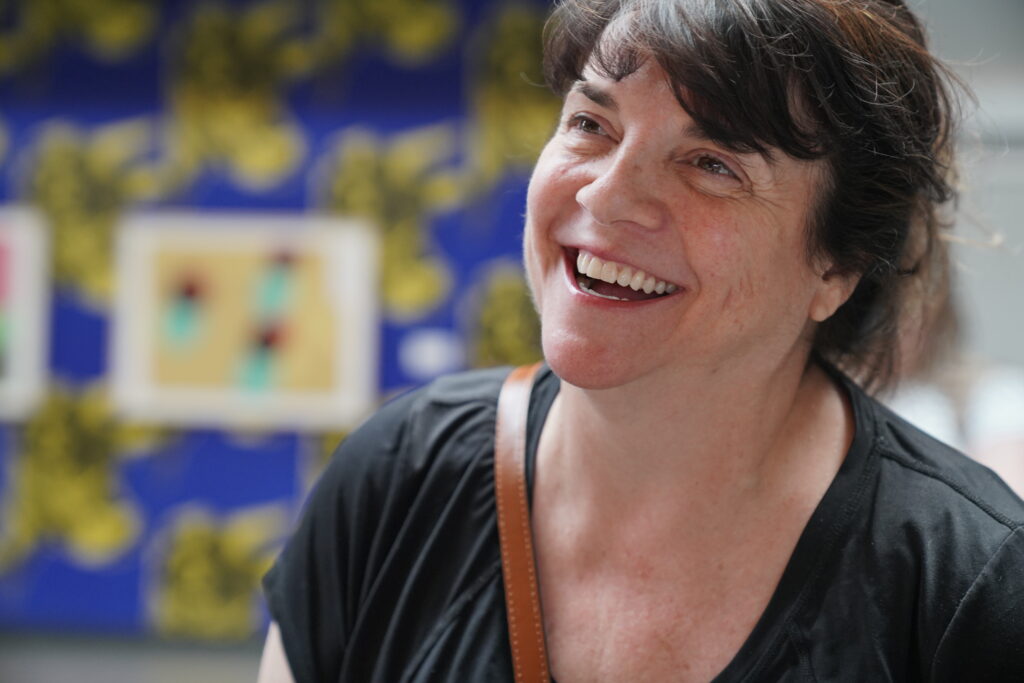
by Tracy Grondziowski
Table of Contents
20 years ago at Allegheny Center Alliance Church (ACAC), Dr Rachel Kittenbrink from Pittsburgh Behavioural Services (PBS) started talking with me about developing a 1-on-1 program for kids with special needs. Back then, I was working as a volunteer advocate for some kids at school, as my child was struggling with dyslexia, and I had a hard time at school myself (I have undiagnosed learning disabilities). I think the main draw for me to say yes to Rachel was seeing families I was ministering to at ACAC over a period of 32 years — seeing what they were going through, and hearing about families who could not take part in our community because of their children.
The program didn’t succeed overnight. We had to change the culture, and we had to change how the people in our community saw the issue: they needed to be educated, and they needed to gain the right awareness. After a while, I got to see the difference it made for those children and families; it was so worth it. We had kids who were once non-verbal now graduating high school and inviting their friends to come celebrate. When you see those big things, you know, “This is right, and God is in this.”
Everything Starts with God’s Call
Two years ago, Pastor Renata from Biblica da Paz in Sao Paulo invited a team to help their church set up a special needs program of their own. I was fortunate enough to be part of that team, and I was able to head back a second time ten months ago, to run further training and join in with the Friends Around the Table gathering (FATT) they were hosting afterward. At that FATT, God made it so clear that I was supposed to take what I had learned in my thirty years of working with kids in special needs global — to share it with other churches around the world.
I fought God hard, at first: “No! You’ve got the wrong person! I’ve got my little home, my grandkids, my life… And besides, I’m not ready.” But God kept graciously repeating, "Tracy, you’re going to have to listen…” It was hard to resist when the people I trusted most — Rachel was at that FATT, and so was Kate Gordon (another person in the core team at PBS) — supported me and confirmed what God was telling me directly: “Yeah, Tracy. You know you’re supposed to do this. This word was so obviously for you.” It was definitely an a-ha moment, and it’s why I made the jump: I left my role at ACAC to partner full-time with PBS as their Development and International Coordinator.
Before I left, ACAC hosted a wonderful time of prayer for me at the church. The congregation prayed for me and the next steps for what would become the global program. One woman in particular came up to me and shared that she had a vision, which she later wrote out for me: “Tracy, I saw you walking around the world with a megaphone in your hand, and you were a voice for kids with special needs and autism.” Once again, God was making it so clear that I was supposed to do this: he was calling me to take everything I knew and share it, to be a voice that others could understand, and to love the kids who needed it most.
"Tracy, I saw you walking around the world with a megaphone in your hand, and you were a voice for kids with special needs and autism."
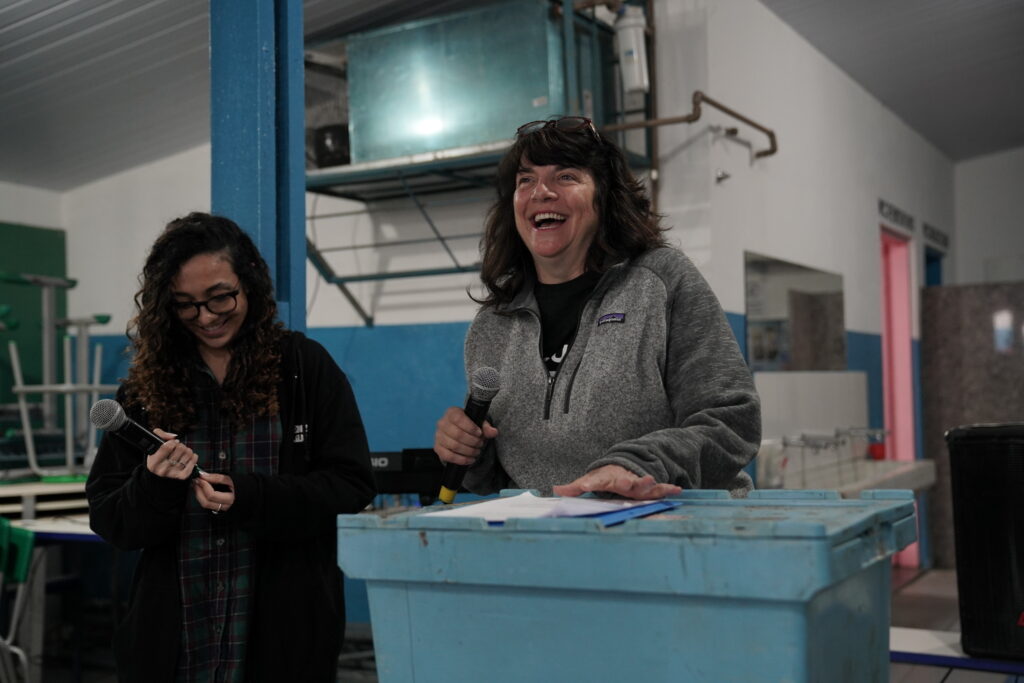
The Nehemiah Autism Center
A few months ago, I had the chance to go to Ethiopia, to work alongside John and Kim Bennett at the Nehemiah Autism Center (NAC), which was set up by our friend Rahel Abayneh to “ensure that children with autism and related disabilities are provided with the education and skills they need to grow into confident adults and become productive members of society.”
It wasn’t the first time I had worked with Rahel or NAC, but on this occasion, we were running a huge course for pastors and kids leaders from all over the continent of Africa. It was a two-day training because so many people signed up. Going into the training, most of them had no idea: they believed that all children who had autism and other special needs were demon-possessed, so they never thought to welcome them or their families. In practice, this means that thousands upon thousands of families cannot go to church — they can’t attend, they can’t worship together, and they can’t receive the support and love they need. The way I see it, they are basically an ‘unreached people group.’
I wanted to be angry, but I knew it wasn’t their fault. I knew they needed education, and to be shown in the scriptures what God says about these kids, including what God calls sin, and what He does not. I knew they needed to see and hear, “Each child is beautiful. Every child is created in God’s image — we all are. It’s not their fault they have a disability; it’s not because of individual sin. We live in a broken world. If disabilities were caused by sin, then every child would have a disability, because we have all sinned. And, in fact, kids with special needs have special abilities, and we need to start seeing them that way — the Church needs to look at them that way.”
At the end of the training time, we pulled two chairs up to the front and gave an open invitation to anyone interested in starting a special needs program within their church, or even just learning about some simple next steps for greater awareness in their community. We thought two would be enough, but we were wrong. Everyone started grabbing chairs and dragging them up to the front. And they didn’t just sit in them, either: they knelt over their chairs in tears, crying out and repenting for the ways they had treated kids in the past, and begging to be filled with the Holy Spirit, so they could move forward with the next steps.
It was so moving. Besides the people kneeling on the chairs, others gathered around to pray and support one another. Everyone was crying. Believe me when I say it felt like the beginning of a revival in Africa. I get emotional even now thinking about these churches reaching out with healing for all these people, and how much that will grow the church. If you have one child who is now able to come, then usually, the whole family comes too, and they can all experience the healing that comes with being part of a church community. After a training session like that, it just feels like the whole continent is ready.
God didn’t just move in their hearts, either… A woman I had never met before walked up to me during that time. She was a pastor from Ethiopia, and she had a prophecy for me: she saw me walking on clouds all over the world with a microphone in my hand, being a voice for children with special needs. It took everything in me not to just break down in tears there and then, because I was trying to minister to others. The Lord was so kind to reaffirm that calling, in such a clear, specific way. It was incredible.

Let It Go Forth from Here to the Nations
After the big training, we stayed to do some follow-up work with Elsa Daniel, who has been praying about this for nine years. She’s from Ethiopia, but she lives in Phoenix, Arizona, with her family, including a child with special needs. For almost a decade, she has been reaching out to different churches in Africa to help with these programs. Most have said they don’t want anything to do with it, including her home church in Ethiopia; that was a huge disappointment for her.
The two days after the training were for 1-on-1 appointments with individual churches who wanted more information. There was so much we could give them in a smaller setting that would have been impossible in the bigger group: it would be like drinking from a fire hydrant. We sat down with these church leaders to find out about their church, what they do in their kids’ programs right now, and how we might be able to help them. We had a lot of information we could share, but it all depends on where they’re at, because every church is different, and there are no one-size-fits-all solutions.
The last church pastor we met with really wanted to start a special needs program for their whole church denomination. As I asked him questions, it turned out that he was the leader of the same church that had turned Elsa down before — her home church. It was so touching to witness the healing that took place for her when she saw their willingness to say, “Yes, we want you to help us.” Their church is now working on a proposal for us to come back and run diversity awareness training, and to help them with their materials at a national level. Their church has about 12 million people in Ethiopia. You can’t tell me that isn’t God!
I was sitting there, trying to look professional, saying, “Yeah, that sounds great; go ahead and send over a proposal that will impact 12 million people.” But inside, I was going, “Oh, thank you, Jesus! Thank you, thank you, thank you!” When God shows up and demonstrates what He wants, He does it beyond anything you could have imagined. Since that meeting, I’ve been getting prayer requests from this pastor, just building a relationship with him and his people. That’s where it always starts: building relationships and loving people where they are.
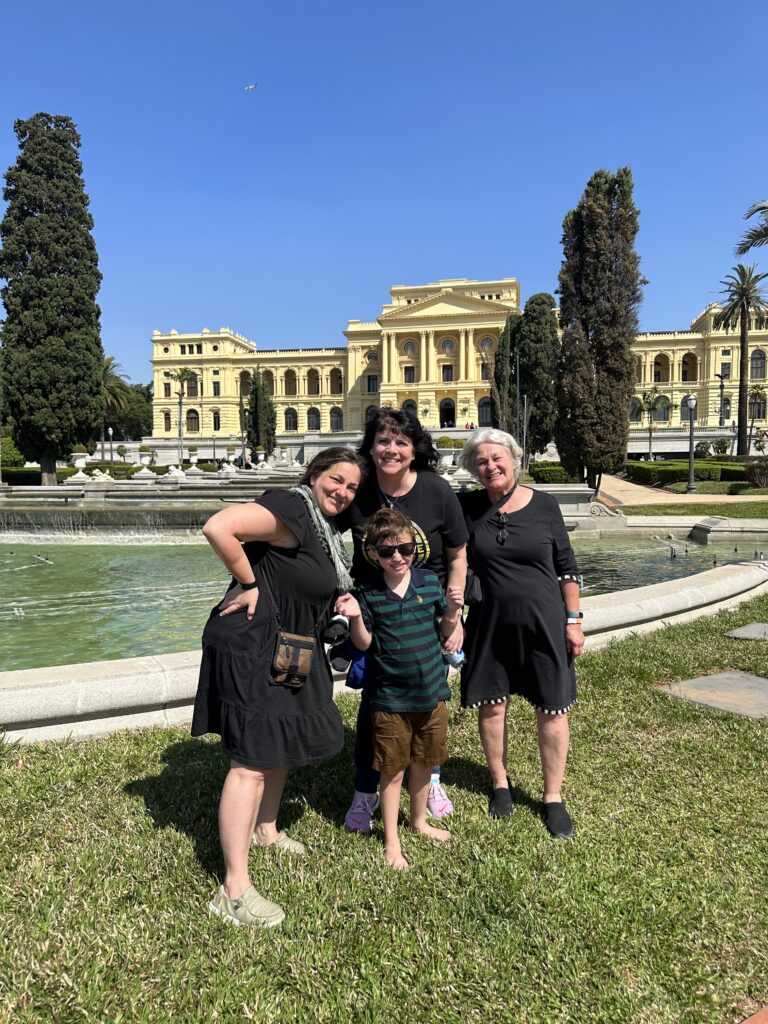
Special Needs? Anything is Possible for those Who Believe
When you consider the trauma families have experienced because of their children with special needs, it’s sobering. The cortisol levels of parents who have children with special needs are comparable to those of soldiers with PTSD. So before you even talk about their child, you have to think about their parents’ mental health — so you can see how you need to take a holistic approach to loving and serving these families. It’s not just, “Here’s a thing for your kid.” It’s, “How can we as a church community come around your whole family?”
Did you know that the divorce rate in families with a child with disabilities may be as high as 87%? And that’s before you think about the impact on siblings, too. So we’re not just talking about a little church program for your child, we’re talking about entire families that could be falling apart, who need all the love and support they can get. As a church community, if you know that, and you understand that, then you can do something about it — you can be the “Acts church” by coming alongside those who are struggling, to love them where they are at.
I believe God is going to take this need and use all of it for His glory, all over the world. In Ethiopia, we had people from America, from China, from Brazil — from a whole bunch of places — sharing testimonies, to show that it can work anywhere. And we were all there because of God, and because of His love for the kids. I believe the kids who have disabilities are actually going to be the ones who end up bringing people together. It’s so easy to think they’re the problem, but they’re not. They’re the answer because they have unique abilities, and because we can gather around them to show the love of Jesus. That’s how the Gospel can spread. He’s going to do great things, and we get to tag along and watch Him work. It’s awesome.
The last thing I’ll say here is: no matter what God calls you to, just say yes! He will provide. He is faithful. It might feel like a rollercoaster at times, but just start journaling the words he has spoken to you. In a few years, you’ll be able to look in your notebook to see what’s showed up. If He calls you for something, He will equip you to do it, and He will send the right people to champion and encourage you (like Rachel has done from the very beginning for me). If you don’t think you can — like I didn’t — that’s actually when He’s going to do His best work. The weak are made strong. And that’s what it’s all about, isn’t it? He shines His glory and love through the weakest of people so that all might see His loving-kindness and turn to Him. God has a plan, and He is good.
In the month since this article was written, my husband and I have felt called (with SEAPC and PBS’s backing) to take further steps with God in this calling, and to start another non-profit, the purpose of which will be to equip and support churches worldwide to address the mental health crisis, advocate for individuals with special needs, and minister to missionary families. We would value your prayers.
I became a servant of this gospel by the gift of God’s grace given me through the working of his power. Although I am less than the least of all the Lord’s people, this grace was given me: to preach to the Gentiles the boundless riches of Christ, and to make plain to everyone the administration of this mystery, which for ages past was kept hidden in God, who created all things. Ephesians 3:7-9
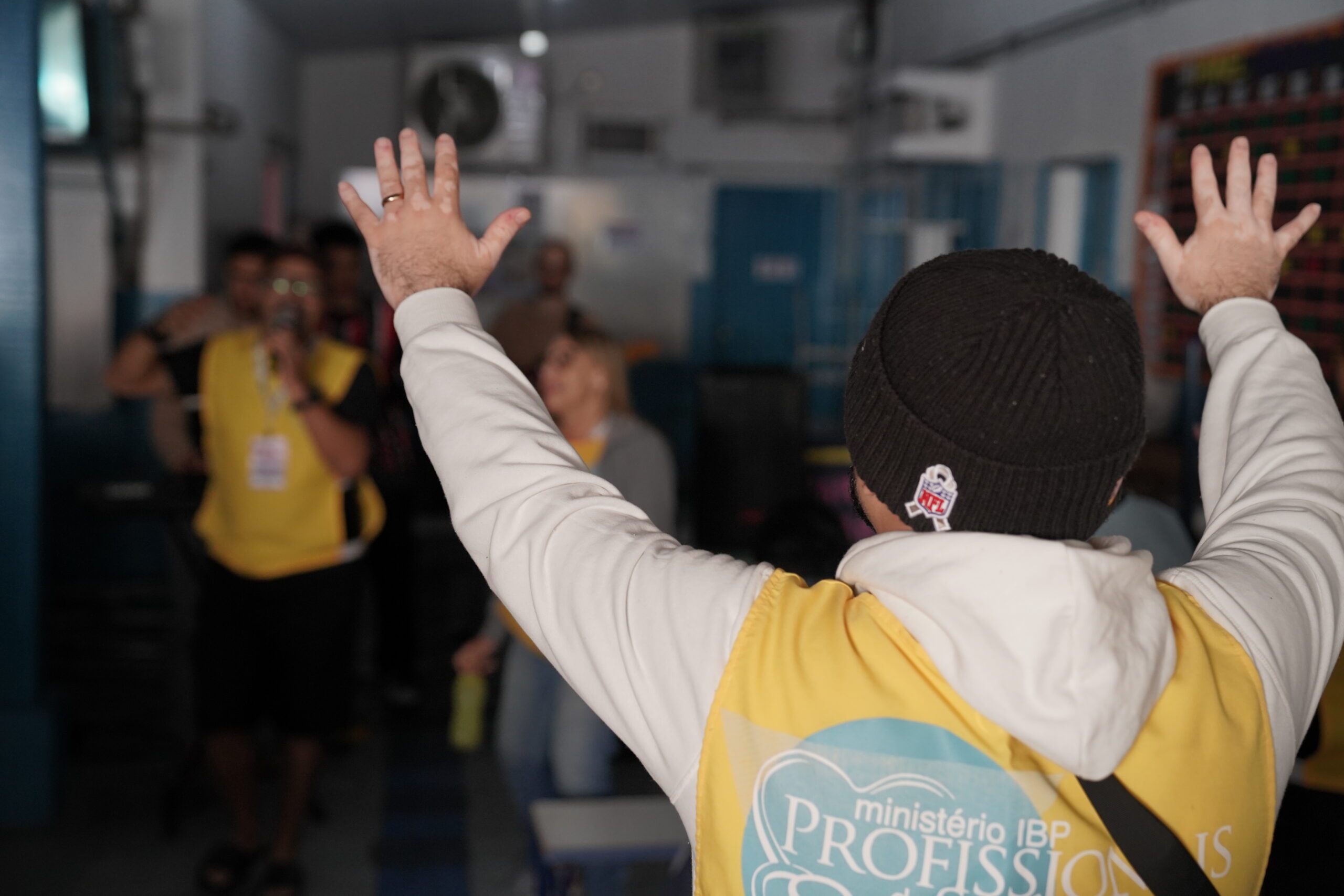
Youth on Fire: 5 Stories of God's Provision on Short-Term Mission
by Leticia Shimizu
Table of Contents
Context: Youth on Fire
Two months ago, Mikeiya and I (both members of SEAPC’s residency program) helped facilitate a mission trip to Brazil, from July 13th - 22nd. Starting in June, one month before the trip, we ran 13 meetings for the teenagers and young adults who joined our team. We affectionately called them “Youth on Fire”. During our sessions, we covered topics including identity, the importance of praise and worship, the purpose of missions, evangelism, the gifts of the Spirit, intercessory prayer, and SEAPC’s Attack Lambs (prayer walking). They were well-prepared.
When we got to Brazil, we partnered with six ministries through Biblica da Paz, my sending church in Sao Paulo. Those were: 1) medical missions, 2) special needs ministry, 3) youth ministry, 4) the Christian military police alliance, 5) VBI (a Bible school the church runs), and 6) a program for students in full-time ministry training at the church (many of them joined our US team, and we involved them as much as we could).
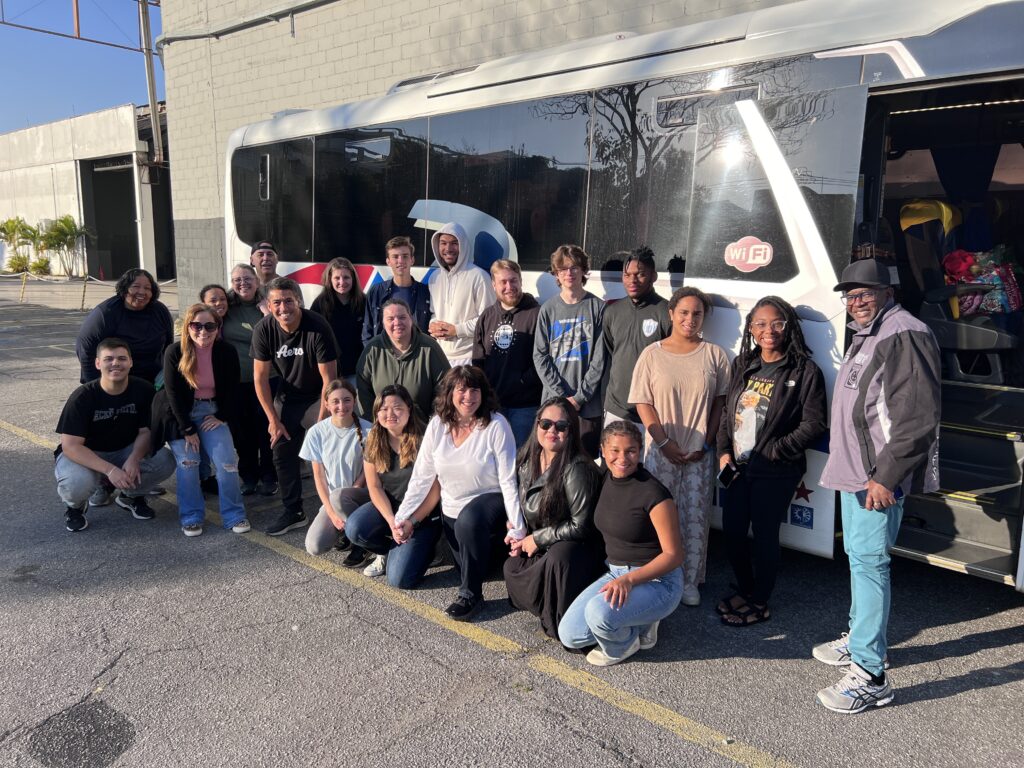
God's Supernatural Provision
A common theme on this mission trip for me was God’s provision: knowing He was in control and would do much more than we could think or imagine. In one of the tribes we visited, for instance, the chief saw a Bible we had brought and asked, “Hey, can I grab this?” And of course, we said, “Yes, please!” We were going to distribute them anyway, but he didn’t want to wait; he just wanted to have one for himself, there and then. As soon as he got it, he held it tight. I think about that episode and I know that God does above and beyond: He moves people’s hearts. We just need to be available and open, and to be comfortable with being uncomfortable. And I see in all of the following testimonies God’s supernatural provision: God moving in ways we could not imagine, completely out of our control.
Before the trip, God would always tell me exactly that: “I’ve got this. I’m in control. You’re not alone. Give me the burden; I’ll carry it.” While we were there, I could see that happening, and I could feel it. I had moments when I was exhausted and I would feel His comfort, or He would send me someone to talk to me and speak exactly what I needed at that time. I saw His care and His hand over all the small details.
Once we were on the ground, we felt like a team of people I knew very well: like I’d worked with them for a long time. At that time, I told God, “Everything I could do before today, I did. Now I surrender to you and with you and for you. Please take control and change whatever you want. If you want to change things while we are here, please do, because I don’t want to run a mission according to my plans.” And the whole time, I thought about the phrase, “God is doing amazing things in us, through us, and more often than not, in spite of us.” I kept that quote in my mind throughout the whole preparation and during the trip and now, looking back and thinking about all these stories, the truth in those words could not be more obvious.
"God does amazing things in us, through us, and, more often than not, in spite of us!"
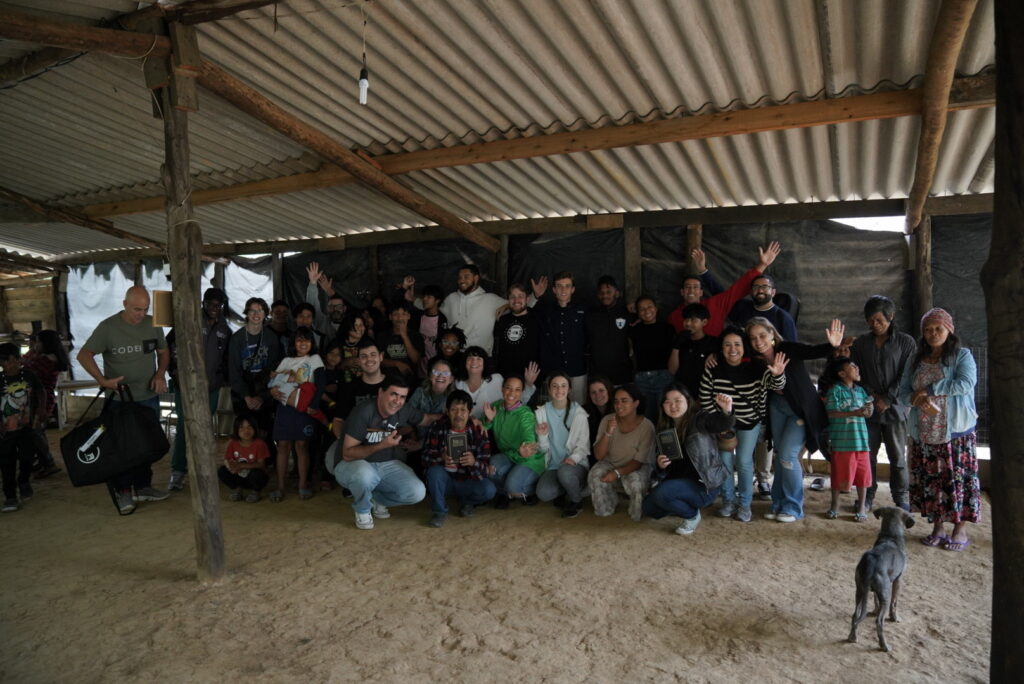
The Chief’s Son
We visited two indigenous tribes. One of them just went through a huge change, because they replaced their chief; apparently, it wasn’t amicable. The previous chief was our friend and partner in ministry. We didn’t know this new chief. It felt like a step back: like we needed to rebuild a relationship that had taken six years to get to. Even so, we trusted that God was in control.
When we went to this tribe, the new chief asked us to pray for his son. This was a big deal, as the chief did not yet believe in Jesus. Jewel and Jeremy, two of the members of our US team, were asked to pray for his son, and I helped translate. As I was asking him stuff, we noticed that either he couldn’t respond or he wouldn’t respond: his face stayed the same. Then the chief said, “He can’t hear you very well. He has a lot of pain and anxiety.” So then, as Jeremy and Jewel were praying, and I was translating, Jumar, who is part of the leadership team in Brazil, stood behind the boy, because he felt that it wasn’t just about healing but about deliverance too (he believed the boy might be demon-possessed).
As soon as we finished the prayer, the chief’s son fell backward. We caught and held him, and he was fine. I then whispered in his ear, “Can you hear me?” And he said, “Yes.” He was completely healed, inside and out.

The Gift of Speech
There was an autistic boy who lived in the community where we were running the medical mission. He had learned English by himself. In fact, he would only communicate in English, which was a challenge, because his mom did not speak English… But guess what? We went with a team of Americans, who were able to speak with him and have a nice conversation. They ministered to him and told him about Jesus.
Another kid had a ‘level 3’ autistic diagnosis, which is very severe and requires a lot of assistance. During the worship time, he was so moved and, like a lot of the people we met throughout our outreach and service times that day, he was baptized by the Holy Spirit. He spontaneously grabbed the microphone and started to praise God by singing worship songs. Everyone in the community started crying when they saw him do that. It was a miracle. That boy wasn’t even able to speak, let alone sing: he was non-verbal up to that point.
We had run a community training just before that night’s worship time with the parents and the kids who had autism, including this boy. Even so, when I think about that moment from a medical perspective, I know it’s not possible for a kid who was previously non-verbal to boldly grab the microphone and start singing in that time frame; that was a true breakthrough. Pastor Renata and her team are helping to follow up with this family and all the others we served through that training.
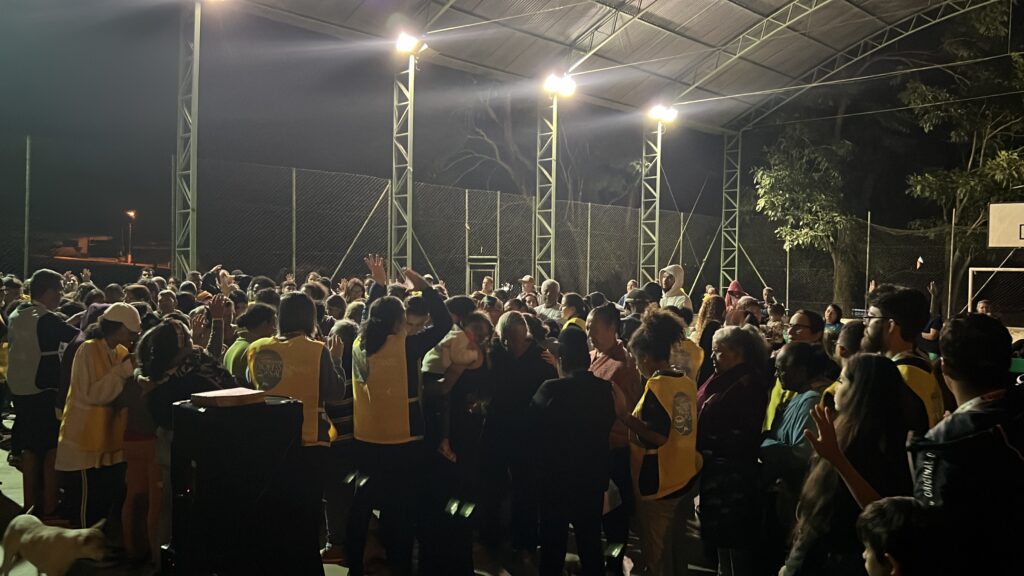
Opening Up
There was another boy in that community, a four-year-old. A missionary came up to me and said, “Hey, can you come with me for a second? I think there’s something wrong with this boy.” I followed her over, and we talked to the boy. I saw his face. It was covered in hematomas, but they were in different stages of healing, so I knew there were probably different traumatic episodes.
When we started chatting with him, he was very shy. His grandma was there too. A little later, I was able to bring this boy to the place we were seeing and treating patients. I asked him directly, “Who did this to you?” He didn’t say. I then asked, “Did your dad do this to you?” He nodded. “Does your dad hit you?” He nodded again. “Does he hit your mom?” He nodded yes. “Does he hit your sister?” He said, “Yes.” So we were dealing with a case of physical abuse on a four-year-old boy.
My friend is a psychiatrist, and she also had a conversation with him afterward. In that conversation, we found out that he wasn’t just physically abused, but sexually abused, too. At that point, we took all the legal measures we needed to. We had lawyers with us as well, and we got in touch with Child Protective Services, so we could protect this kid from his dad. Everyone on the team reflected: “If that was the only life we touched on this trip, then it would be worth it.
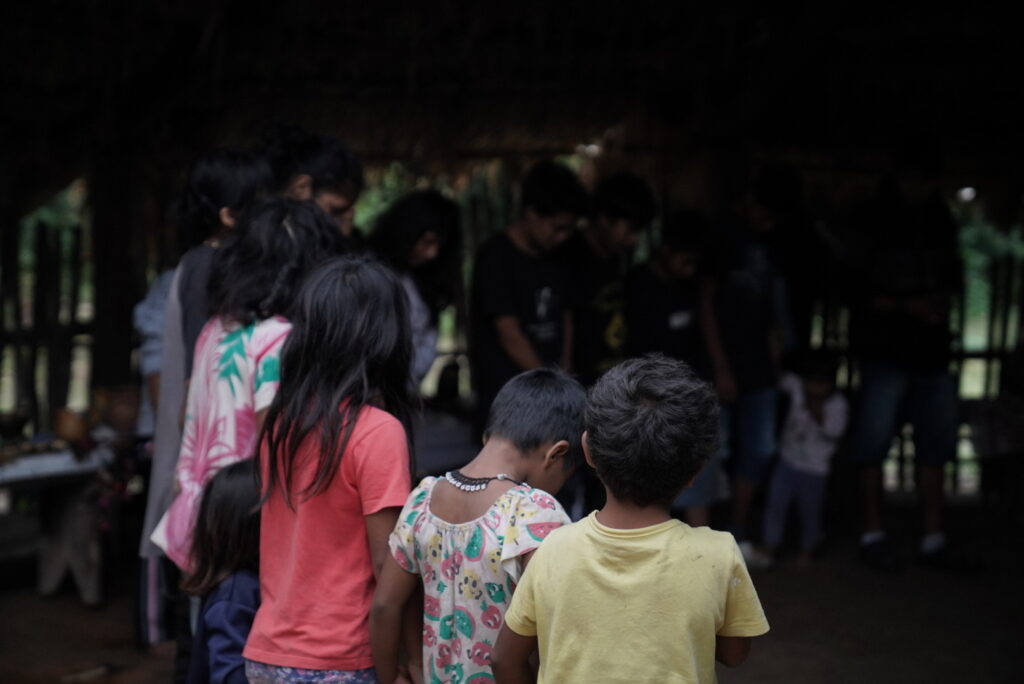
Losing My Voice
Eight years ago, we visited the same community on a different mission trip, and I lost my voice completely. I was supposed to speak publicly on one of the days of our trip. A lot of people prayed for me. I drank a lot of medicine. Nothing happened. I remember that I went to the worship leader and asked to be taken off the schedule because I couldn’t even speak. She said no: “If God told you that you’re supposed to minister, then you’re supposed to minister." So I waited and prayed. By that Sunday evening, I was still voiceless. Still, I grabbed the microphone, and as soon as I did, my voice came back. It was awesome. Right after I was finished, my voice was gone again.
This time around, it was no different: I started to lose my voice on the Friday of our trip. Little by little, I kept losing more and more of it. By the time it was Sunday evening, and I was supposed to minister, it was completely gone. I prayed and told God, “You did it once before, and if you want to, you can do it again.” This time, I didn’t take any medication; I didn’t want to give it any credit. If I was healed, it would be God. Five minutes before the service started, I went over to the worship team and asked, perfectly normally, “Hey, how are you?” My voice was completely fine.
We ministered as planned. It was wonderful because God gave me a very different strategy for that ministry time: we made space to pray for the people. “Does anyone here want prayer? We are here on this mission. We’ve been here before, but it’s a completely different team. Each mission is unique. You’re never going to have the exact same team, in the exact same place, in the exact same community. So we want to take this time to pray for you guys.” Everyone wanted prayer. Right after the service, after we had prayed for everyone, my voice was gone again. It took a week to recover.
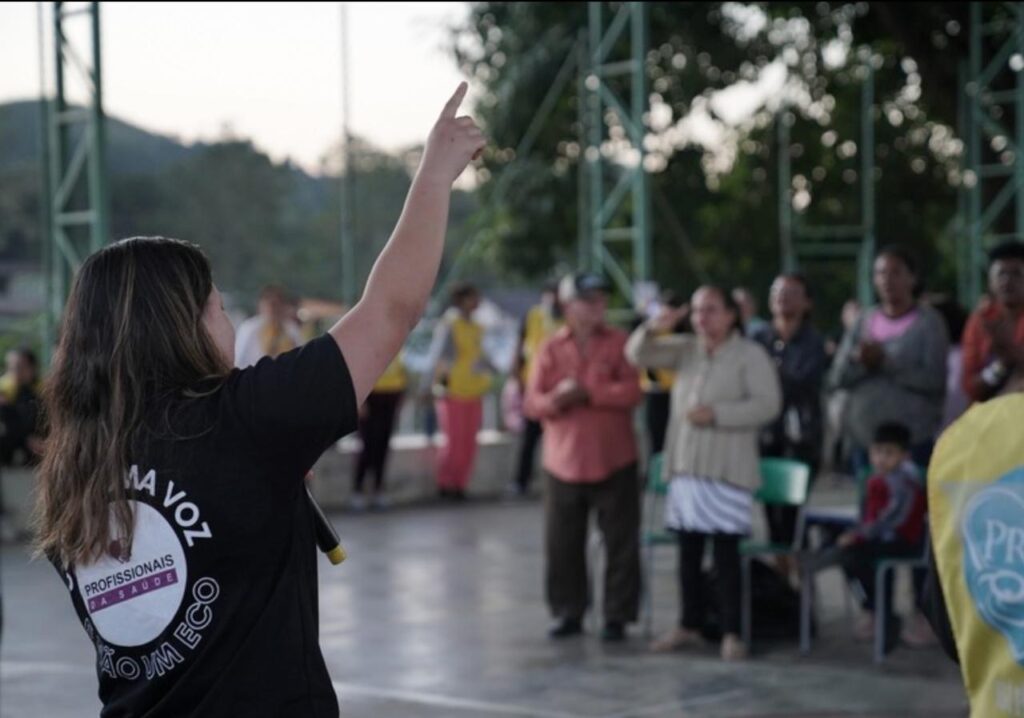
The Group on Fire
On the Sunday morning of our trip, we had devotions. After that, Pastor Campos asked, “If you are new to missions, and you feel like God is calling you to this — whether that is in your country or the nations — then I am inviting you today to make a commitment before God. We want to pray for you, and to send you out.” As he said that, and the other translator translated his words (I had lost my voice at that time), he asked me to pray for the US team — for anyone who wanted to step forward.
Almost everyone stepped forward and received prayer. Many of the kids, and even some of the adults on the team, received prayer. This was really powerful because Mikeiya and I wanted this mission to be fruitful, to be impactful in their lives so that they could go back to change their churches and cities. I prayed for seven or eight people (quietly). Molly, Esther, Rebekah, Kamera, and many others stepped forward to say, “I want to make this commitment. Lord, send me!”
As we were debriefing at the end of the trip, we heard some testimonies from a few of them. I know there will be a lot more (look out for future stories on this blog and on SEAPC’s Instagram). I saw their lives change forever when they consecrated themselves that day, and for me, that moment — seeing them realize what God’s plan for their life was, and seeing them be willing to say yes to that calling — was worth the whole trip.
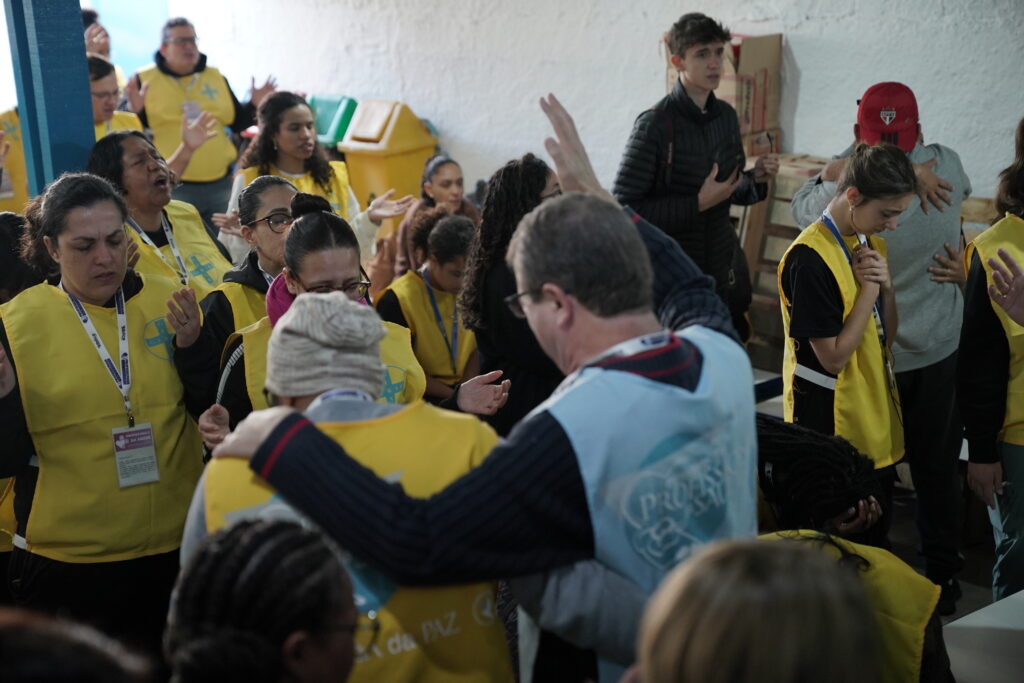
Short-Term Seeds, Long-Term Harvest
I am so grateful for all of these ‘little’ stories because, on short-term trips, you have to hit the ground running. You don’t have a lot of time; time is not in your favor. Everything is intense. Every day counts. Every hour counts. So you never want this kind of trip to be a one-time event and then you’re done; you want it to be fruitful, even if that means you’re planting seeds someone else will water, or even if you’re just watering, and you don’t see the final fruit. That’s what these short-term trips are all about.
I was privileged to stay behind in Brazil for a few extra days to hear about some of the fruit. Every day I was there, I met with the pastors and leaders of the six ministries we worked with on the trip to ask for their feedback. They all said the same thing: they were excited, humbled, and honored by everything we got to do together, and they can’t wait for the next opportunities we have lined up.
I also had the chance to talk with Pastor Edson Rebustini, Biblica da Paz’s senior pastor. He too opened the doors wide open for us: “You should definitely come back. Next time, do things with some of the other ministries as well.” We don’t need to be told twice, and I can report that we are already helping to organize a medical mission with their church to serve SEAPC’s friends in Cambodia, planned for 2025.
God is faithful, and the best is yet to come. He will do even more than we can ask or imagine. To Him be the glory!
Therefore, I urge you, brothers and sisters, in view of God’s mercy, to offer your bodies as a living sacrifice, holy and pleasing to God—this is your true and proper worship. Do not conform to the pattern of this world, but be transformed by the renewing of your mind. Then you will be able to test and approve what God’s will is—his good, pleasing and perfect will. Romans 12:1-2

A Comprehensive Guide to Apostolic Ministry

by Jared Lenhart
Table of Contents
Keeping the Focus Where it Matters
The apostolic ministry my family looks after, Frontier Harvest Ministries, which partners with SEAPC (they help us run our admin and finances), is all about unreached peoples. That’s our main focus: working among unreached or unengaged ethnic minorities; it’s always at the forefront. All the other stuff just happens naturally — the food and clothing outreaches, printing, literature, planting house churches — but we just keep our focus where it matters: on the unengaged people who have no known church.
How do we do that? We pray for them. We find ways to send people to them, get “boots on the ground.” Even though we can’t always be there, we can map out where we think they are and get the information into our team’s hands so they can go. We send resources, plan with them, and send them out. That’s our job: always challenging our people to go: “Don’t forget the people who have not yet heard about Jesus. Don’t get stuck in your little church community. Go! And then keep going!”
We have a lot of locations in China where there are churches we’ve planted and people we’re connected with already. We often find that there’s a tribe only two mountains over from them that have never heard the Gospel. Maybe there’s like 800 people in that tribe; it could be really small. The churches nearby have no idea, because they don’t have the information. They’re not online, but we are, and we’re looking for this stuff. After we find it, we send it over to them so they can go.
Sometimes, they won’t find anything. One dude went out for over a month, and told us, “I couldn’t find them! I don’t think they even exist!” When that happened, we had to say, “Whoops! Sorry…” But then you think of other examples, like this random Mongolian tribe we found out about in Sichuan. It’s like they got lost along the way — like Genghis Khan accidentally left them there. We sent some people out, they found them, got a family saved, and they’re starting to disciple them now. Before we told our friends on the ground, they didn’t even know they existed.
Most of the time, they live like 20 minutes from the place! I’d have to sit on a plane, fly 24 hours, and spend $2,000 on a ticket to get there. So if I just give our partners $2,000, they can go out there for two months and get it done themselves. Just don’t rip us off, though — because that’s when I’d come over on a plane and kick your butts…
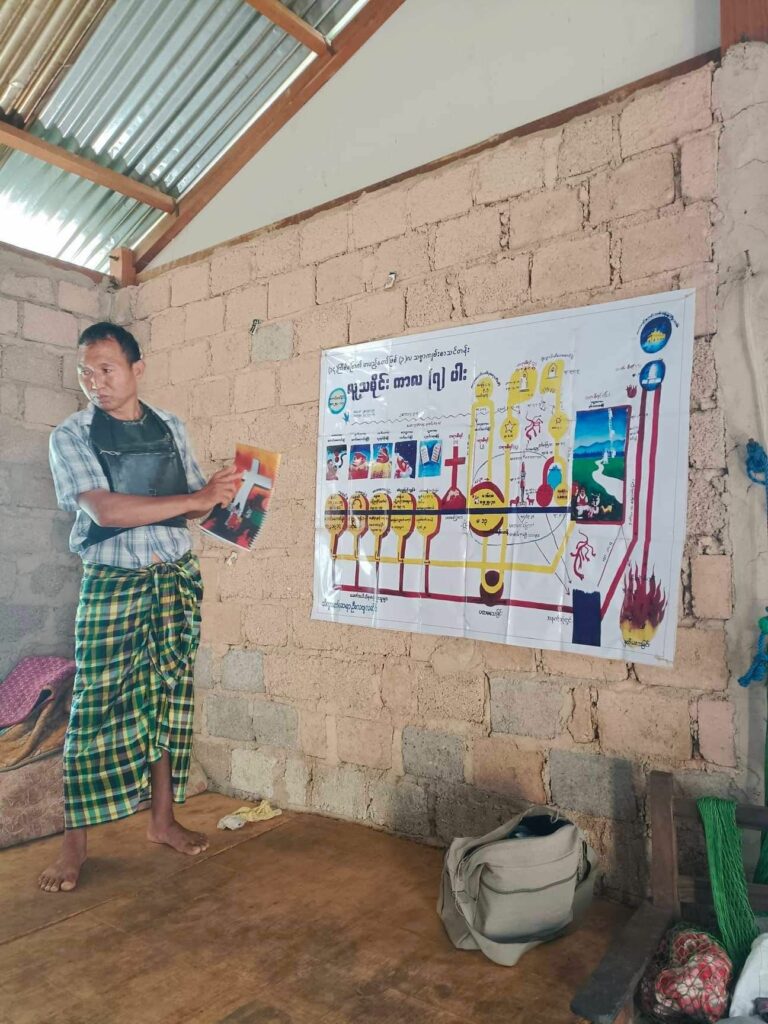
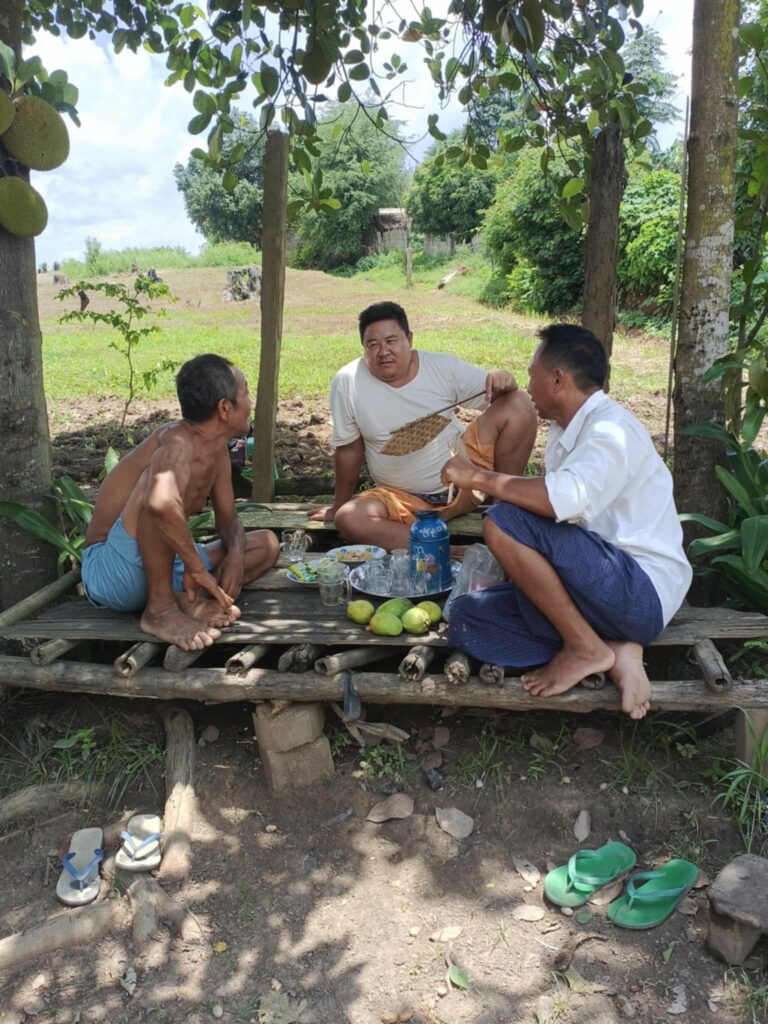
Contextual Ministry: "Men of the Dirt"
We call this sending initiative, Men of the Dirt. They’re the people we put our lives and resources into: our core team. They’re the face of the nation that we get behind so they can do it. They can go to places we can’t, they can get in to talk with locals, and they can reach the tribal people.
Myanmar’s version of Men of the Dirt started through a “coffee shop” we ran (we never actually sold any coffee). We had five guys that lived there — all evangelists — and they had the heart to go out, but they didn’t know what to do. They all graduated from Bible school, but after that they were just waiting on the sidelines. They needed some direction.
So we would have team meetings every week and tell them, “You two, hit up this street this week. And you two go to this street, and you two head to that street. Here’s the money for gas and food. Now get out on your motorbikes. Cruise around and try to bring someone back here on Sunday.”
And that’s the same thing we do now with the current Men of the Dirt. We send them out to these unreached and unengaged places so they can bring new converts — new tribal people — back to centers like that original coffee shop. Nowadays, we get them plugged in to our “Vo-Tech Center” in Lashio, Myanmar (Vo-Tech = Vocational Technical School), so they can learn haircutting or animal husbandry. The main objective is to get them in, make them a church planter, and send them back home to start something in their houses. It’s Gospel training with job creation in between, so it’s doubly useful.
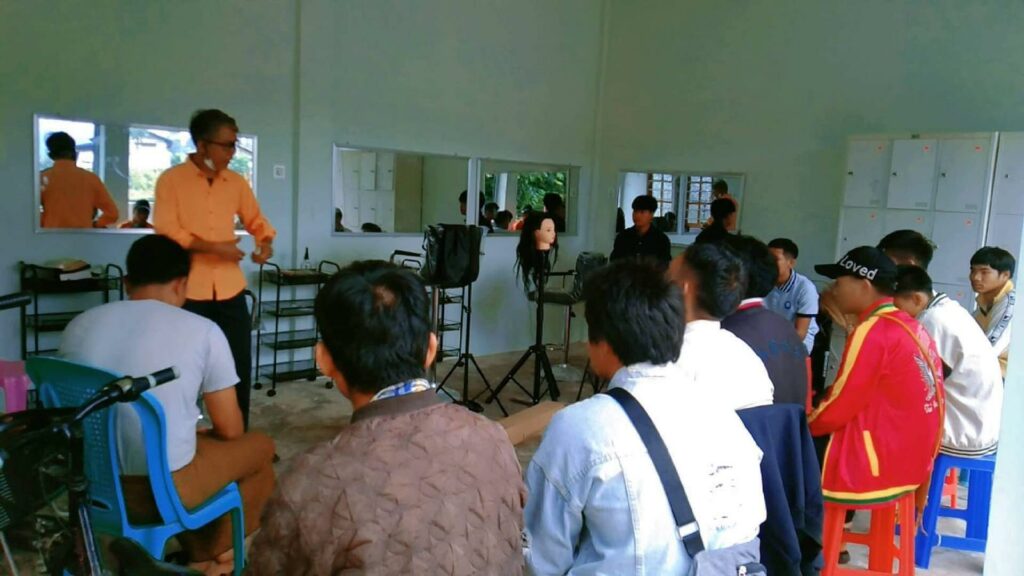
Apostolic Ministry: The Basics
Apostolic ministry is all about the Great Commission: making disciples, seeing people you teach eventually share their testimony and teach other people. That’s what makes us happy. The feeling that, “Aw, man, we put all that time into that guy, and he’s doing it! He’s actually living his life for Jesus now.” There are a lot of people who come and go, so when you see people like that — the ones that stay and grow — making their own decisions, teaching and imparting to others, it’s simple but beautiful.
And that’s what apostolic ministry is: you gotta start something, and then God will move you on. He’ll move you to new places, but you gotta be ready for the change. If you just want to be stuck in one place, you’re not gonna grow. It’s like a pond: every part has to have an inflow and an outflow. If you don’t have the outflow, it’ll just become a stinky pond with no life in it, and die, and grow crappy organisms. But if you have that outflow, the water stays fresh. So you gotta get ready to keep flowing. Once you make a “pond” somewhere, get ready to be apostolic and flow to the next place.
People think “apostles” are some big guy up there doing all the work, or something like that. No, man! Being an apostle is just about building something up and then letting other people do it, and then moving on. It’s about teaching people, preaching to people, being able to pastor, evangelise, prophesy, impart — all of those things — and then move on, and do it again. Rinse and repeat: “Wax on, wax off!”
I only know this because I saw my parents doing it in China, and then I would travel with my dad, and he would teach me all these things, and then I would see them doing it, and then I would learn it, and then I would see them doing it some more, and then I would learn some more. I’ve never been to Bible school. I didn’t go to college. I got through high school all right, but I don’t have a big education. Only the Holy Spirit can teach you these things: you hear and see it in others, and then He teaches you, reminds you, through your life experience.
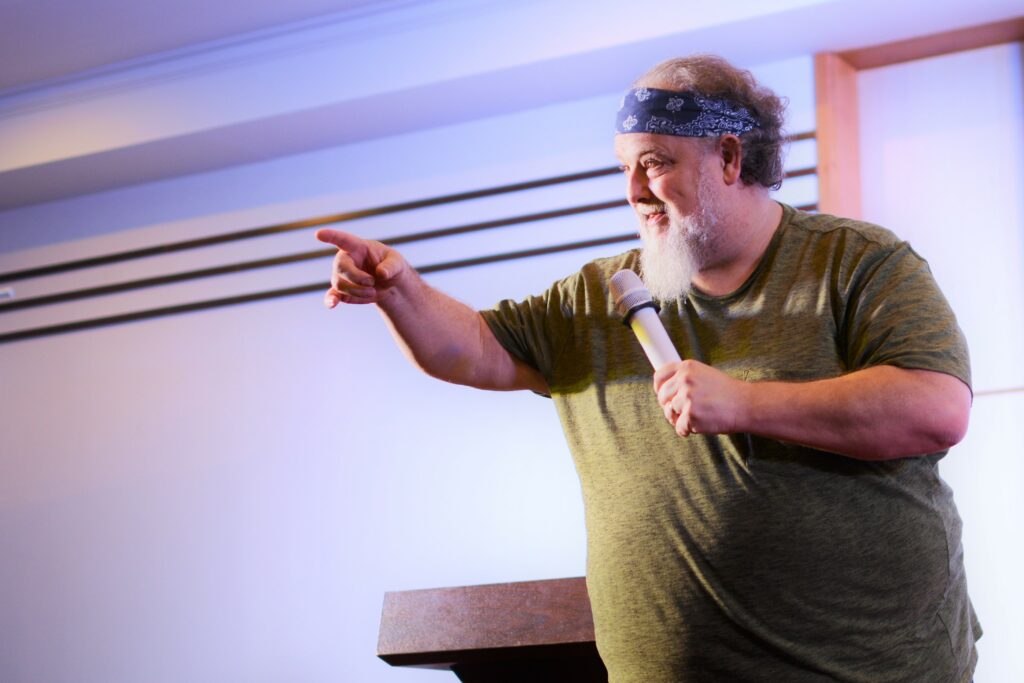
Apostolic Ministry: Applying Paul’s Example
In 1 Thessalonians 1:4 it says, “For we know, brothers and sisters, loved by God, that he has chosen you, because our Gospel came to you not simply with words but also with power, with the Holy Spirit and deep conviction. You know how we lived among you for your sake.” Paul, Silas and Timothy had to go to Thessalonica so the people could see how they lived, and then they too could live the way they lived. They were an example of Christ to the people.
And then later on it says, “And so you became a model to all of the believers in Macedonia and Achaia. The Lord’s message rang out from you not only in Macedonia and Achaia—your faith in God has become known everywhere.” Other people heard the Gospel through the Thessalonian church, not through Paul — through the Body he inputted into. So that’s what being apostolic means: seeing the people that you input into being able to input into others, and keep going, constantly.
In Mandalay, after three years, we have our core team of around eight people. Every week, we teach them from Zoom. And then they have their own core team. So we’re teaching the core team, and the core team is teaching their core team. It’s like a domino effect, but you gotta keep bringing new people in and letting the core team teach them. Don’t bring them to us any more! We’re done now. You guys are the ones to give it to them. You gotta get them to do it. Don’t get them into the habit of bringing people to you.
Right now, our goal is just to oversee: to make sure things are moving forward and goals are getting reached: that we’re finding those “people of peace” we can open a new house church with. It’s a simple strategy: the team goes and hands out some tracts, and the person who lets them into their house and listens to them — that’s the person of peace. Most likely, in a couple of months, that person’s home will be a house church where people can be baptized and read the Bible together— real simple.
There’s just one catch: you’ve got to be a little careful when it comes to mixing locals, foreigners and money…
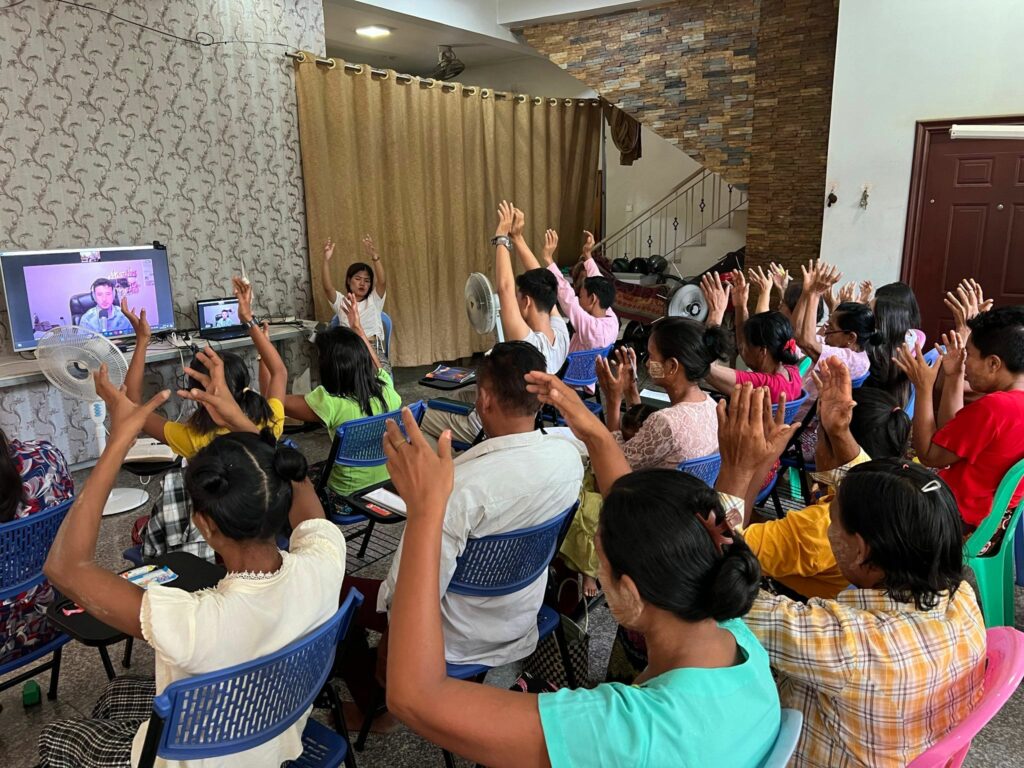
Apostolic Ministry Key #1: Dealing with Corruption
Way back in 2012, we connected with a family in Burma that ran a children’s home. We were still in China, so we had to travel over to meet them. They were a couple from my wife’s tribe — the Lisu tribe — in Lashio, and they only had like 12 kids at the time, in a little bamboo shack. The couple owned the land, and they had space to build and develop it, so our ministry committed to them.
You know, you can’t just go over and say, “Have a good life now! See ya later! We’ll be back next year to take some more pictures!” You gotta do something about it and help them. So we decided to take this couple on full-time. We tried to follow in SEAPC’s footsteps with the children’s programs: raising $50, $100 a month for each child. We made high-quality profiles for all the kids.
Later on, we found out that they were just taking the money; they weren’t putting it into the kids. They weren’t doing what they agreed. The communication was bad. One day, they would say they needed this much, and the next day, this much, and we were sat there thinking, “How did it go from $5,000 to $10,000 in two days?” They told us, “Oh, the prices change… things change…” This went on for about five years.
Eventually, we sent Robin, one of our core team from China, to the children’s home. We told them he was coming. He lived there for two weeks and found out all the crap: all the kids got was rice and soup, and they had to do everything in the property; they were like slaves on the land. The couple didn’t even come to the children’s home; they just sat at home. And they bought other land with the money we gave them: a house, cars, all kinds of stuff. If you want to buy all these things, then communicate with us! Maybe we could have raised some funds for that, but this money was supposed to go to the kids. Why weren’t they eating meat every day? Why weren’t they getting the nourishment they need? And why were they still living in a crappy environment?
After finding all that out, we moved there ourselves to make a sustainable work and to fulfil our promise to the kids — by then, there were about 70 in total. We tried to work with that couple at the start of that time, but when we brought more accountability, they freaked out and gave a bunch of excuses, a bunch of red flags. Eventually, they got up and left because they didn’t want to be part of a team — but other brothers we knew in Mandalay came and found us, and we formed everybody into a core group.
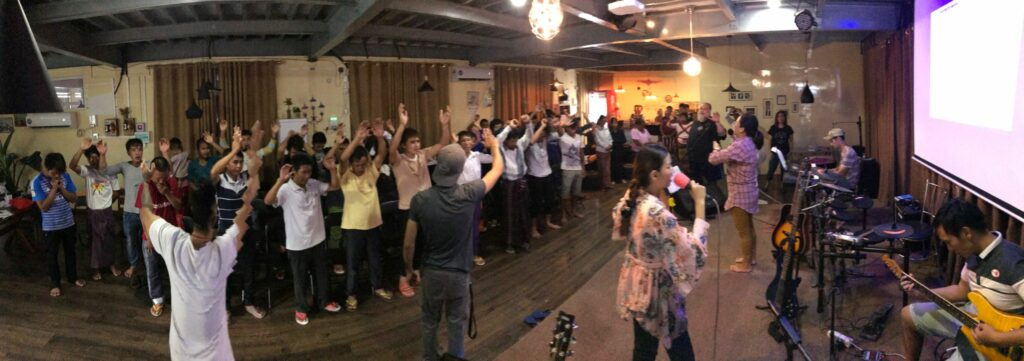
Apostolic Ministry Key #2: Dealing with Broken People
In apostolic ministry, you can’t worry about things like, “Oh, if we get rid of this guy, what’s going to happen? He’s so gifted, so talented. If we fire him or tell him to go home, it’ll slow the process down.” That’s not what we want to do, but we can’t be afraid: don’t think that if you don’t have one person, the work’s not going to get done, because God will bring somebody else, somebody more suitable, to take their place.
We had to deal with that a lot: people who weren’t humble, who were in it for themselves. These are people you love at first. You think they’re really good friends but then, later on, they stab you in the back. We had people steal motorbikes from us, use us to pay their rent, and then leave, and some people even robbed our home! Stuff like that. Petty stuff that can stop you from wanting to serve God, and can make you hate people.
It’s easy to get into the mindset of: “That person’s a Christian?! They ripped me off!” But for the most part, we’ve realized it comes down to: they already had a messed up life. Their background was terrible. They never knew what real love was. So those are the people you deal with that come on your core team: you gotta teach them what real love — Jesus’ love — is. You would think they’d know that as Bible school students, but most of them don’t. Most of them never had a dad who told them he loved them, or a mom.
You’ve also got to give to people to find out who they are. You have to give resources, money, opportunities to work. And slowly, you find out who they are. And then you deal with it: you show them how if there are problems, you face them directly. No gossiping, no going to others, just talking face-to-face. You have to teach people: “This is the biblical way to do it, to have a healthy relationship, to be human.”
In apostolic ministry, you gotta learn how to deal with people. If you can’t deal with people, you can’t serve God. Love one another. He wishes that all would be saved, and none would perish. For God so loved the world… He gave his only Son for people. So that’s the first thing you gotta get in your head before you even go to the mission field: you’ve gotta learn to love people properly.
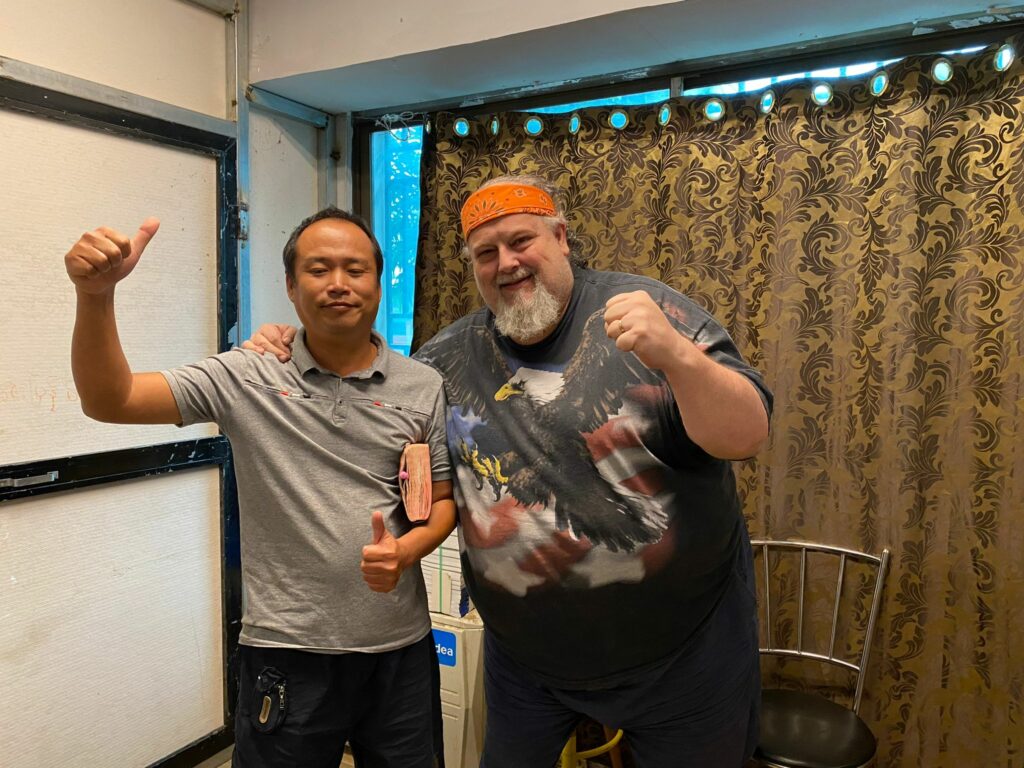
Apostolic Ministry Key #3: Dealing with Broken Culture
In Myanmar, there’s this thing we call Buddha-brain. You gotta get rid of it. It causes confusion. Even when the people become Christians, some of them keep that Buddha-brain mentality: the culture doesn’t go away. Sometimes, you gotta break it out of them, smack them in the face with love, tell them their problem in love, and then show them how to get out of it.
Buddhist culture has no love. Buddhism is not about love. It’s all about works and pleasing others: putting on a fake, false humility. Sure, they walk by, and they have to bow their heads, but they’re also judging you at the same time: “You got more money than me.” Even in my wife’s village, where they’re all Christians, you can see it: it’s all about how you look, how you dress, what kind of house you have. They go to church on Sunday, pay their tithes, listen to the pastor, but it’s all for show.
So you can’t go over there and kiss too much butt; you can’t bow to the culture. You can’t let people step all over you. You gotta have grace when you go into these cultures, but you can’t let them use you. People try to use you for your money. That’s what they think: “Can you come “pray” for this piece of land?” And they really want to show you the land because they think you can help fund a building project there — which is not wrong, but it’s just not what we do. We just say, “Sorry, man, but we can’t do this for you right now.” And then they’re out of there, and they don’t want anything to do with you any more!
Myanmar can be so corrupt. You don’t know if a pastor is just some military slug-ball: his cousin could be in the military, and they’re all paying one another, and they control everything, and even sell drugs to the village. That’s the level of corruption we’re talking about. Even some of the Christian village elders: they’re sitting in the nice seats on Sunday, with their suits and ties, and they’re not even pastors, but they’re doing deals with the Chinese who come into their village, taking bribes and working with the military. Buddha-brain. You gotta deal with it, and you’ve just got to press on.
And one more thing: God can use you even if you don’t know the language! Obviously, it’s better to know the language and understand the culture, because that opens another door to communicate with people. But everything we’ve done in Myanmar has been led by God, and that’s the key. Before we went, we didn’t even know we were going to start a church. We went in and out a couple of times first, and we prayer walked. And we just felt: “This is the place we need to come. There’s a spiritual hunger here.”
I’ll admit: I thought it was crazy then, but I look back now and I can see how God brought the right people, at the right time. When you step out and go and do it — when you hear His voice, and then you do it — it’s a step of faith. He’ll bring the right people to you as you’re doing it. You don't have to worry about how it’s going to get done. You just have to deal with Buddha-brain when it pops up, with the love of Jesus.
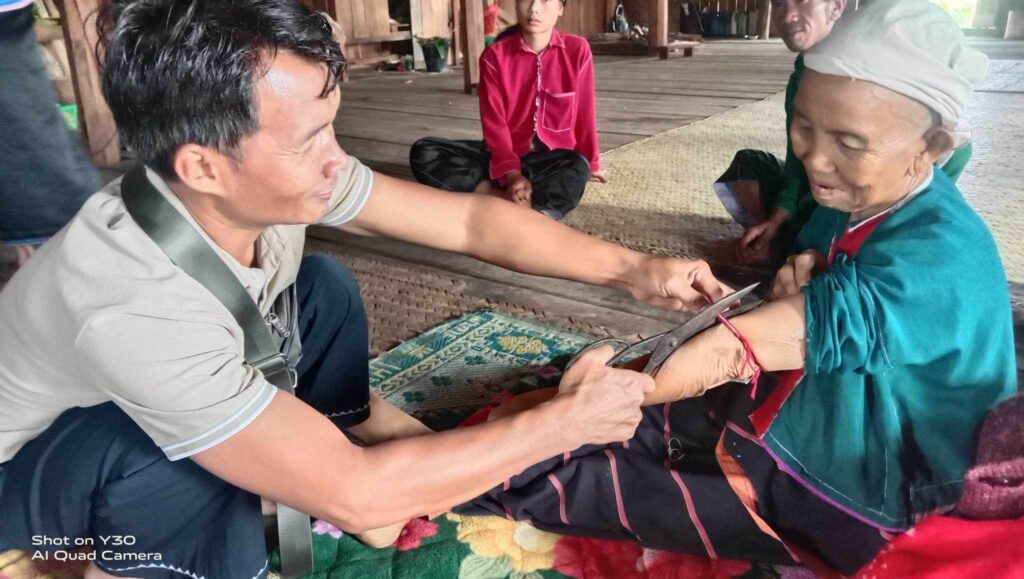
Apostolic Ministry Key #4: Dealing with Misconceptions
At one point, I wanted to do some work in my wife’s village, with the Lisu people. We planned a three-day crusade: we were going to get all the people in. We talked with a bunch of the elders and asked them how much they thought it would cost: “Oh, you need like a thousand bucks…” To them, that was a lot of money, but we figured: “A thousand bucks to reach 200 people, including the drug addicts?! Let’s do it, man!” Of course, the church had the money to do it, but they wouldn’t use it for evangelism — they would use it on their building, or for monthly wages, or whatever.
So I got some guys together, and we had to do a dinner for all of the pastors, and pay for the food. And then one guy found out that we were “tongue-talkers” (we speak in tongues). It turns out this guy had been burned in the past: he went to Korea for Bible School, where they taught him that if you don’t speak in tongues, you’re not born again, and if you don’t speak in tongues, you’re not saved. So he automatically thinks we’re like that — that we’re some kind of cult. He thought, “Oh, they’re going to poison all the people in my village!” And he warned the elders, so they shut our meeting down, one day before we were about to do it. That got us really darn angry.
At times like that, you just have to move on. It’s like trying to pour old wine into a new wineskin. The young people wanted to do it, but in places like Lashio, the village elders control everything; that’s how it works. You have to put everything through them. So if they’re traditional, and they don’t like something: forget about it.
Eventually, they chilled out. They even let us build a centre in their village — my wife’s village. Now, a few years later, because they know who we are through my wife and her family, they’ll come to us for help. It’s because of that relationship that they have been able to see how we help people, and we’re willing to donate stuff. We helped build an eating area for the kids at their school, bought toys, books, that kind of stuff — giving a little money to help out. So over time they could see we weren’t “crazy cult charismatics.” Now they know we have a real heart, and we believe in Jesus.
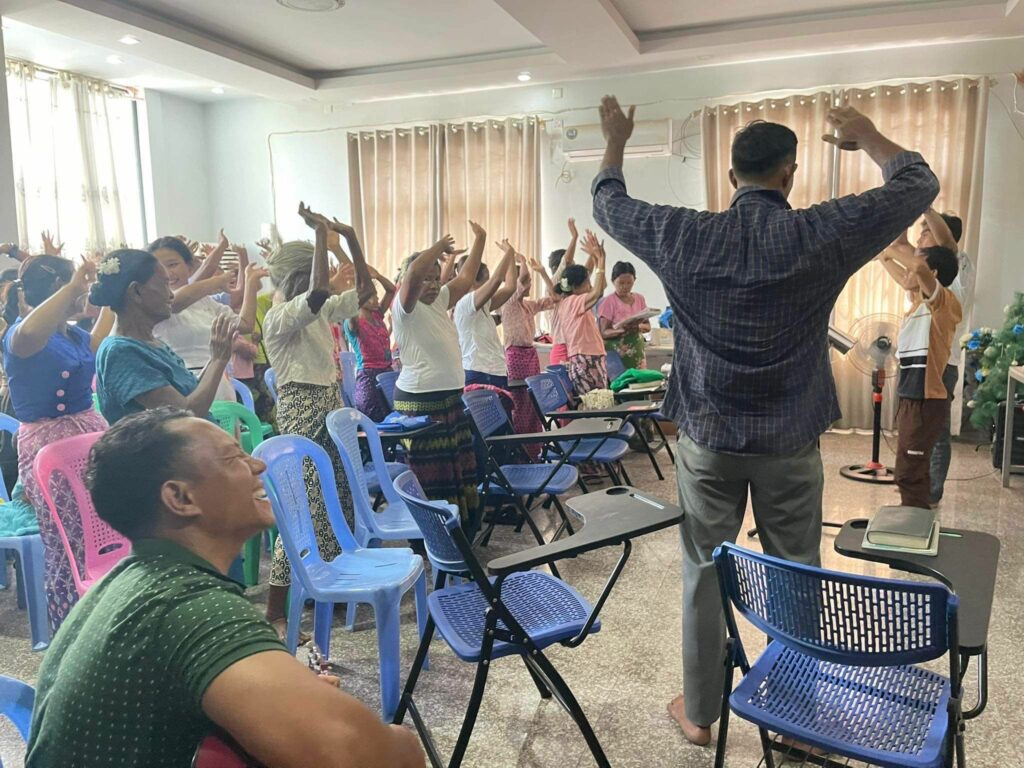
Apostolic Ministry Key #5: Dealing with Your Own Fear
There have been a lot of times that fear came into me. Fear, anxiety, stress. Just trying to do meetings sometimes, knowing that you’re not allowed to do that with locals. Travelling, even. Trying not to get stuck in war zones or go through military checkpoints. Wondering if this person’s going to be the next to rip you off, but trying not to think about it too much! Just things you gotta deal with on the mission field. Controlling your thoughts, having the mind of Christ towards people. Not getting bitter when people leave the team or use the team for their own selfish reasons…
When opposition comes, especially, that’s when the fear comes. When the elders or whoever don’t let you do something, when they say you can’t do it, or they’re gonna go and tell on you… that’s when the fear can come in and hinder you from what you think God is calling you to do — like getting guys to live in our Vo-Tech center…
There was one time when we communicated clearly, and everything was good, but when they came, the village elder got all paranoid because the converts were from another tribe. He was afraid that they were going to cause problems because that tribe was known as more of a “warring tribe.” He didn’t want any trouble in the village. Before they came, he didn’t know they were from that tribe.
So one of our brothers was like, “Oh no! I guess we have to stop now. We have to send them home. It’s done. It’s over.” And we had to be like, “No, dingleberry! No, man! We didn’t bring these guys down from the mountain for nothing! It took them like three days to get here, and you’re just gonna send them home?” It’s times like that that you can’t give into the fear.
So what do you do? You go find another place. Go to a hotel. Go find another brother’s house — which is what we did in this situation. God opened the door. You just can’t give into the fear when it comes. You gotta pray through it. Pray, and find God’s peace on what decision to make because sometimes, when plans change, confusion can come too. Always have a backup plan, or an idea in the back of your mind. Be ready to go with the way you think God wants you to, but have another plan, just in case something goes wrong — and then God will lead you to that plan! You gotta be ready.
And sometimes, you gotta be spontaneous — you gotta make spontaneous decisions. Sometimes, there’s not time to make up a backup plan, so you just pray about it with your team: “OK, which decision are we going to make? You guys feel peace about this? Alright, let’s do that.” And this is all the stuff you learn when you’re out there, just doing it, and living life. You just have to learn it.
After all that, you’re left with the good ones, the ones that stick with you. That’s your core team. It might not be 100 people. Maybe it’ll be like 5, or 10, or however many, but all you need is a handful of willing people to get the job done, to reach the people God wants to reach. You don’t need a lot. You just gotta run the race — run the marathon for Jesus. Paul and all those apostles already crossed the finish line. Right now, it’s our turn to run and try to get there, and bring more people with us along the way: “Let’s go! Come run with me!”
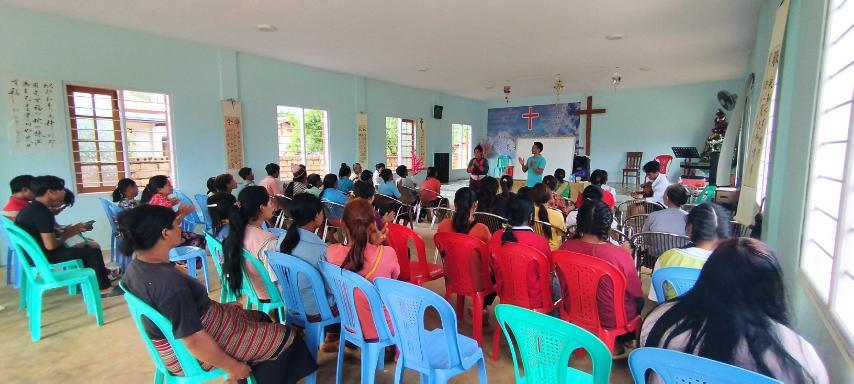
Final Thoughts: It’s a Good Life Serving God
At the end of the day, it’s a good life serving God. People think you’ve gotta give up stuff — and you do: your will, your desires — but people don’t realise that when you do that, He’ll give you better stuff. I didn’t expect to get a wife and a son going to Burma. That’s the last thing I thought about: “Oh, I’m going to leave Burma with a family!” And that’s the best present you can get. When you serve God, He provides everything, but you gotta give your life to Him, and go where He wants you to go, and do what He wants you to do. You have to sacrifice a few things, sure, but if it’s about reaching people and wanting to help the lost, He’ll make a way for you. He’ll make a way every day.
Forget the former things; do not dwell on the past. See, I am doing a new thing! Now it springs up; do you not perceive it? I am making a way in the wilderness, and streams in the wasteland. Isaiah 43:18-19

The Burning Rose Bush
by Benjamin Chua
Table of Contents
Hello there! My name is Benjamin Chua, and I work part-time at SEAPC as a “Storyteller and Community Connector” (as much as I like this title, I must admit someone else came up with it). I also have the privilege of being a Friends Around the Table (FATT) regional representative with my wife, Mercy, who works full-time with SEAPC.
One of the main responsibilities Mercy and I have in our volunteer role as regional reps is helping to organise an annual gathering in Europe / the Middle East. The first two we hosted were in London, in 2022 and 2023, and the next one, which is just around the corner, will be held in Berlin, Germany, in July 2024.
God has taught us a lot at these gatherings, but perhaps my biggest takeaway from these times has been: God has a great sense of humour, and God has a plan. Let me share briefly about the last Friends gathering in our region, so you can see what I mean. (Spoiler alert: this story features a special guest appearance from a stubborn but miraculous rose bush.)
Open Eyes, Open Hands, Open Plans
It was our second year coordinating the event, and we were keen to apply our most valuable learning from the previous year: God is the one “setting the Table” for us; we just need to follow His lead. So how did we start in 2023? By praying and listening to God as a team, and doing our best to plan accordingly.
As we gathered on Zoom, we heard and saw a total of seven things that we felt were from God:
- “Action!”
- “Just do it!”
- A mental image of a long, heavy broom with thick bristles, accompanied by an invitation to perform community service in love.
- Another mental image of a crystal ball, and the call to prophesy life and truth in place of counterfeit visions.
- Ephesians 3:12 (faith in Jesus brings freedom and confidence).
- “Open eyes, open hands, open plans…”
- Bring revival… back to Jerusalem (from West to East)
Some of these words and pictures seemed like clear calls-to-action that did not need a huge amount of interpretation (especially the first four words), while the rest required a little more discernment to nail down…

Faith in Action
We started with what we understood instinctively — God’s call to act — by putting prayer walking and community service front and centre all three days of our gathering time, in addition to the normal FATT schedule.
On Tuesday, the first day, we partnered with a local church to walk and pray around Battersea and Nine Elms in Central London. Before the groups went out, we encouraged everyone to focus on prophesying the truth in love, making friends, and interceding for open doors.
On the Wednesday, we planned an itinerary full of service-oriented street outreach in Abbey Wood, East London, which culminated in an open evangelistic prayer & praise night at our vicar friend, Ruth Turner’s, church building.
On Thursday, our third and final day, we plotted a prayer walk around Clapham Common, where many 18th, 19th and even 20th century heroes of the faith like William Wilberforce, Oswald Chambers and Charles Spurgeon lived and laboured for the Kingdom of God. We urged all of the friends gathered to pray that the revival work God started through these great faith fathers would once again flow from the UK into the nations.
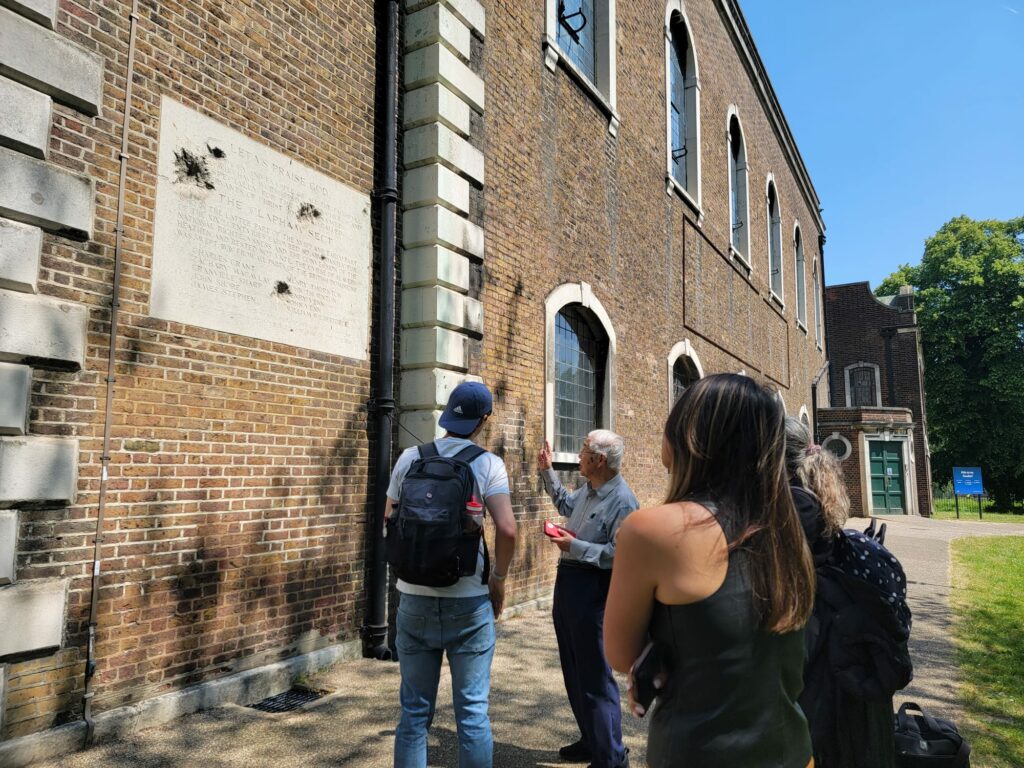
God Delivers Fish
After describing how Jesus provides a miraculous catch of fish and welcomes Peter back into ministry, John, the Beloved disciple, concludes his gospel by saying that if he were to record everything Jesus did, the whole world would not have room for the books that would be written (John 21:25). FATT 2023 may only have been three days’ long, but I have a similar feeling about what took place in London… so I’ll zero in on the central story, chronologically speaking: our service day in Abbey Wood.
As I mentioned earlier, our main task in East London was to serve the local people in practical ways. After our morning praise and teaching time concluded, we did this by sending out two teams: one to pick up litter, and the other to help Ruth with her church building’s long-term gardening needs (specifically, cutting down some intrusively tall, thick grass, and uprooting several very heavy, very stubborn rose bush stumps).
The two teams were also given a bundle of business-card-sized flyers to hand out as they served the neighbourhood. These cards contained an invite for the event we were co-hosting with Ruth’s church congregation later that evening: “JOIN US FOR FREE PIZZA & PRAYER @ WILLIAM TEMPLE CHURCH!”
SEAPC was to provide the pizza, and William Temple Church were going to provide the venue, music and a welcoming atmosphere. The back of the card said as much: “All welcome to a night of pizza, prayer and music at William Temple Church, Abbey Wood.” The time and address were included below.
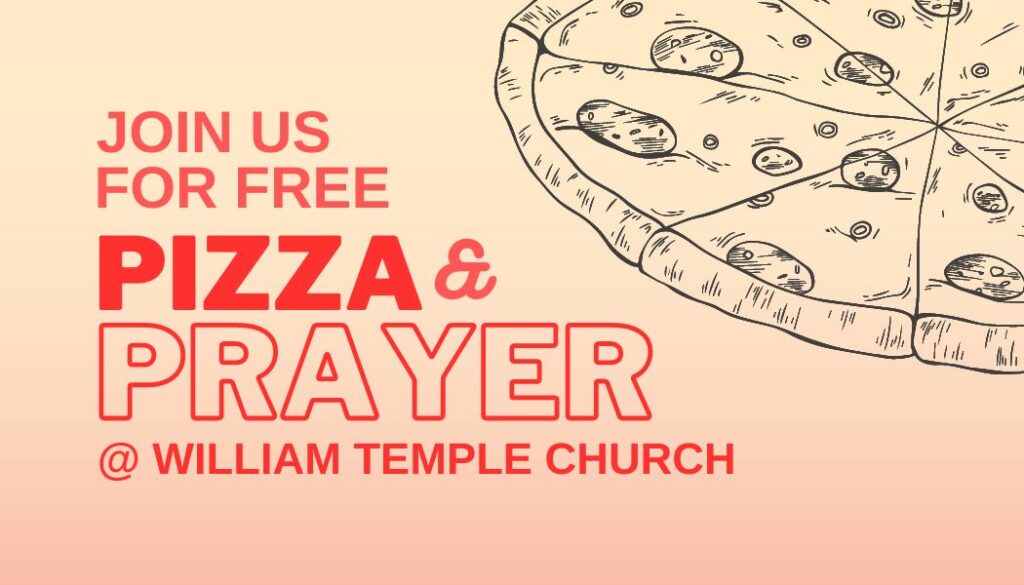
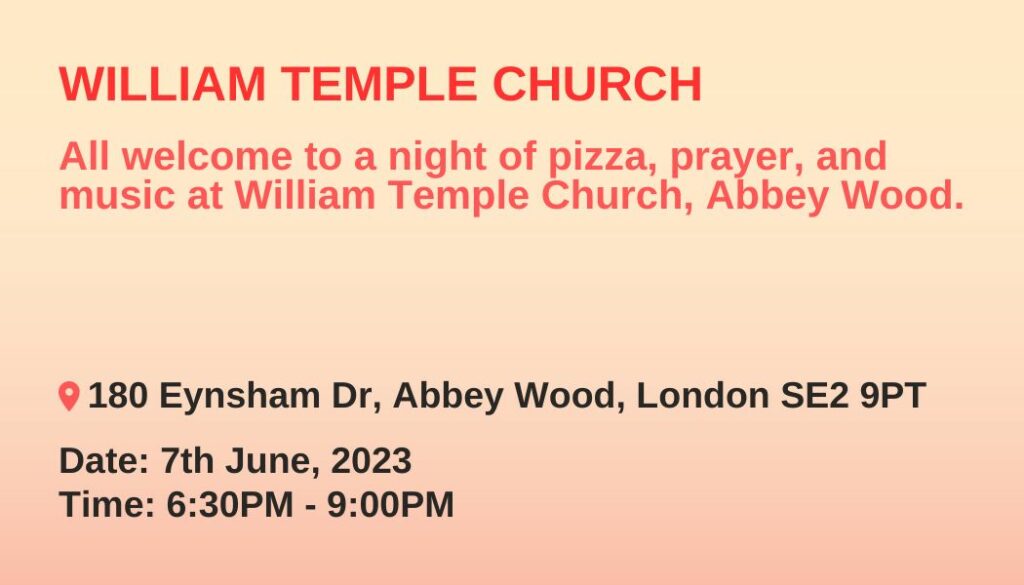
Signs to Make You Wonder
As it turns out, engaging in visible, practical acts of community service is a great way to get chatting with passersby: a sign to make people wonder. I could imagine some of them thinking: “Why have these people come here? What on earth are they doing?”
I also imagine their curiosity could only have risen once they heard American accents, and saw well-dressed pastors holding large white rubbish bags and handing out business cards… I say “imagine” because I was part of the gardening team, not the litter-picking one. Nevertheless, I heard from that team that they had great conversations, and were able to invite plenty of people to the evening’s festivities.
As an added bonus, one of our friends spontaneously (i.e. without any knowledge of the seven words we had received in prayer as a team), wore a special baseball cap on each day he attended our gatherings. Guess what it said? (See below for a great example of God's humour).
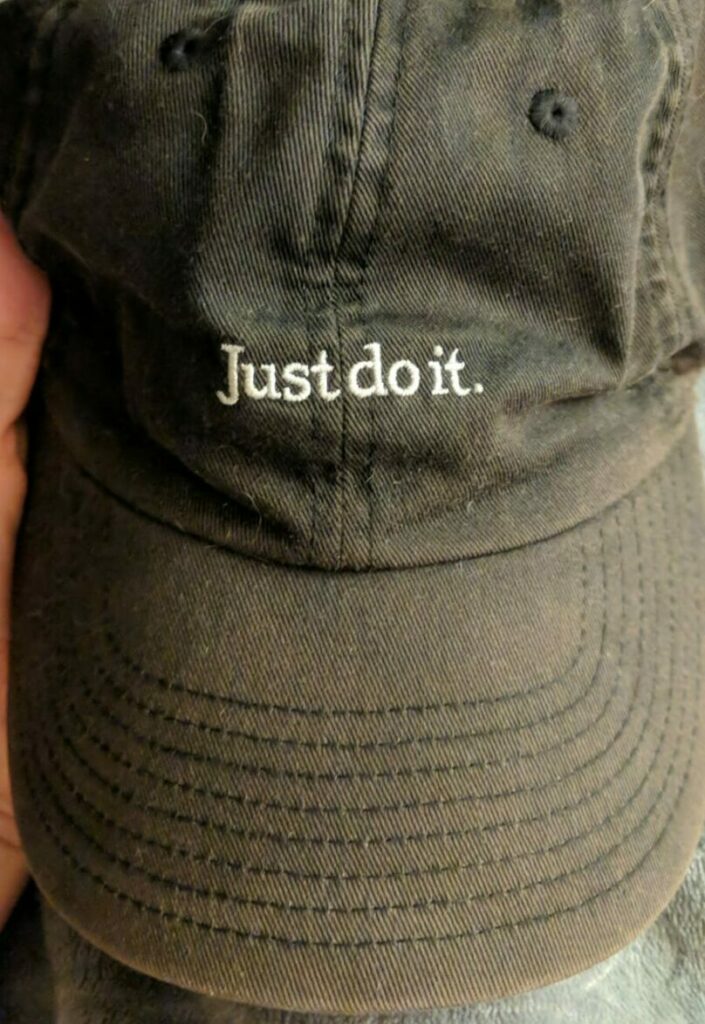
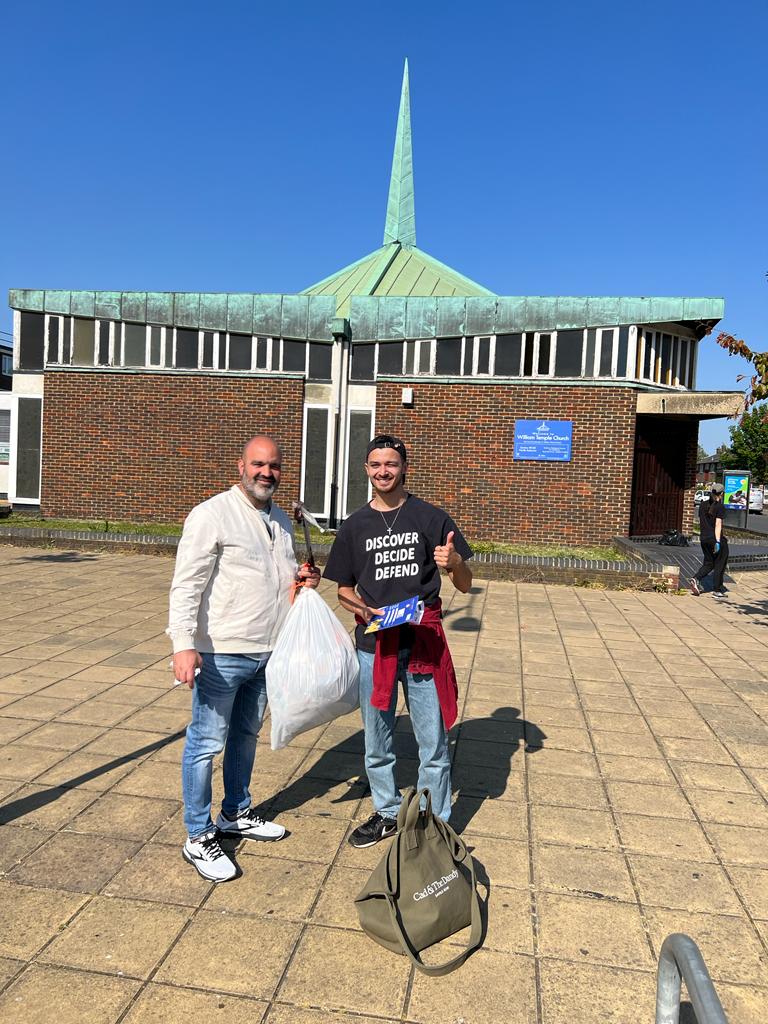
Rose Bush: Enter Stage Left
On our team, the flyers were a great excuse to take rapid mini-breaks from the heavy-duty labour work required in the church garden. Nobody tells you this in school, but rose bush roots are obstinate and heavy. It took Mercy and me almost two hours to hack away at just one of the bushes, and it wasn’t until 530pm — half an hour before the event — that we finally heaved it out of the ground.
By this time, we’d already been able to talk to students coming home from school, mothers picking their children up from daycare, and other locals going about their business, to invite them to the event. Many were positive and promised to join in. We weren’t done yet, though…
The two of us hoisted our rose bush prize off the ground so that we could carry it to the dumping area on the other side of the church. About halfway there, next to the bus stop, we ran into three young men, so I called out, “Hey! What are you guys doing tonight? We’re hosting an event in this building with free pizza, praise and prayer; would you like to come?”
If I were them, I would have been just as shocked as they looked: who was this strange man holding a muddy thorn bush? What was this event he was talking about? They stopped for a moment and thanked us for the invitation, but ultimately declined: “We’re busy, but thanks for offering!”
“No worries! It was great to meet you. Bless you, and have a great evening!” I called after them. They waved back awkwardly, with bemused smiles, and went on their way. Mercy and I went back to the task at hand, then found time to clean ourselves up before the church doors opened.
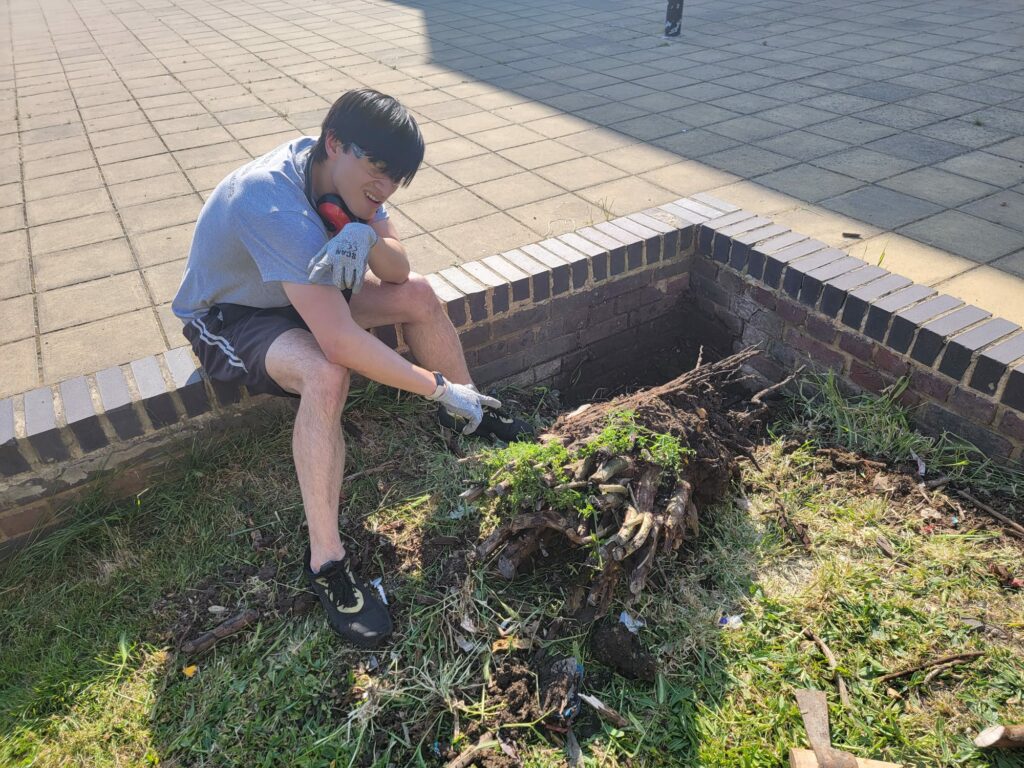
The Power of the Rose Bush
In hindsight, I reckon that rose bush was infused with God’s presence: it decided to come out exactly before those three young men walked by. I also reckon it was strange enough, and the invitation was unexpected enough, to make them think twice.
Even though they “had plans,” they came back! All three showed up partway through the service, when people were standing up to testify about God’s goodness and inviting those gathered to receive His healing. I welcomed them in and got their names (which I’ll change here for the sake of this story): “Arthur,” “Ambrose” and “Michael.”
Slightly awkwardly for them, they appeared at the back door to the side hall, rather than the door to the main sanctuary, which meant they had to enter the sanctuary from the front (via the internal door connecting the sanctuary with the side hall). Given that the meeting had already started, that meant walking through with everyone watching. They bravely made the journey past the pulpit to sit in the first row, right in front of Matt Geppert, SEAPC’s president, who was sharing a word.
Shortly after Matt finished speaking, we broke for a time of prayer, and Matt went straight up to one of the young men. Matt asked Arthur how he could bless him that day, laid hands on him, spoke prophetically into his life, and then did the same for other two.
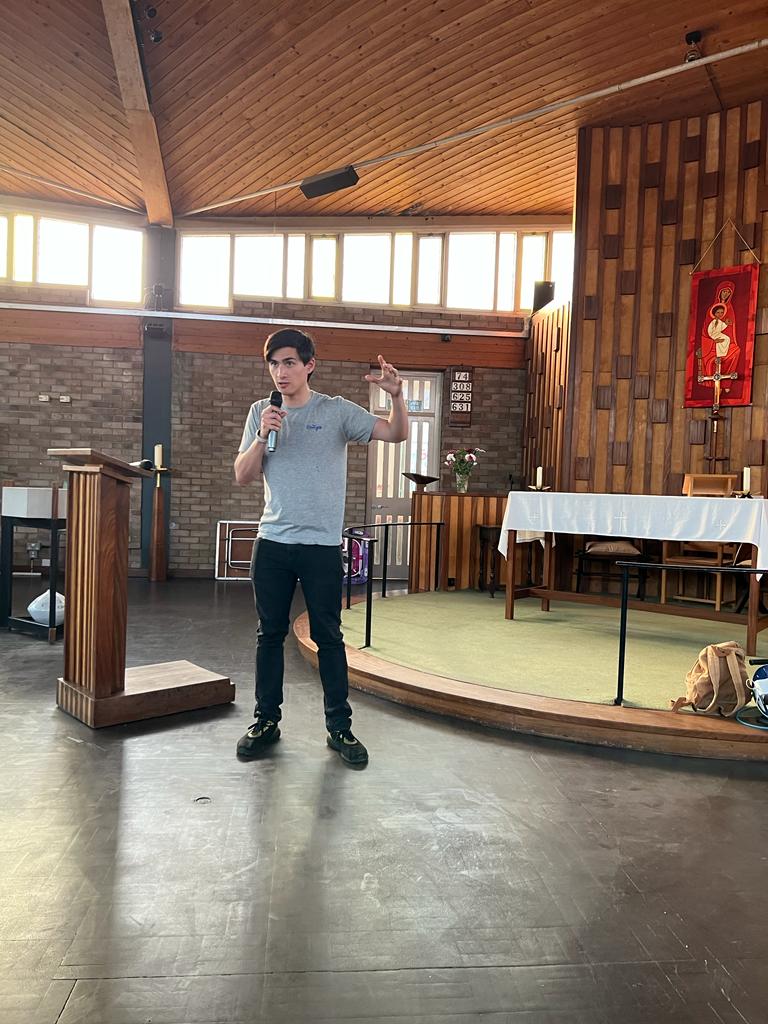
Summoned
During that time, I was praying too: a long line of people who had accepted the invitation for the event came up to the front for the team to lay hands on them. Just after I finished praying for one person, I heard someone calling my name from the side hall door. I turned to see Arthur beckoning me over: “Do you think we could chat with you and your wife, Mercy?”
Mercy was busy praying for others, so I texted her to let her know about their request, then joined them in the side hall once more. They were standing in a horizontal line, waiting for me, just in front of the kitchen island where we’d served pizza not long before.
For some reason, they looked a little imposing in the moment, and I felt a strange anxiety well up in my chest. I figured it must be a spiritual attack of some kind, so I started praying in tongues quietly and asking God for a confidence boost.
“We have something we want to tell you. We’re Muslim, and we would like to hear more about Jesus and what you believe. We were struck by your invitation on the street. Everything happens for a reason. That’s why we asked you to come over here; is Mercy coming too?”
I explained that she was still praying for others, but would come over when she could, then suggested that we pull up a table and chairs to chat — I would be more than happy to share about my experience with Jesus. There were folded tables and stacked chairs in the corner, so we got set up quickly.
A Different Vibe
We talked for ages, trading stories about our experiences with God. Mercy joined about thirty minutes in (she had to help pack down the sanctuary first), and shared the reason for her hope in Jesus. It was a great conversation and, by the end, we exchanged contact details so we could keep in touch and chat more another day.
It would take too long for me to recount everything we discussed here — we kept talking until just before 11pm, and even had to ask Ruth if we could stay in the building, as everyone else had left, and she had to lock up (she graciously agreed to let us stay on) — but one moment that stood out to me came in the first part of our conversation. I asked Arthur, Ambrose and Michael why they had decided to come back after their initial ‘no.’
Arthur replied, “Something about the way you asked us felt different. When we left, I couldn’t stop thinking about it. I’ve met people from different faiths before, and they’ve invited me to things, but you guys just had this energy. I couldn’t work it out, and the feeling wouldn’t go away…”
And then he got personal: “My dad died last week, and it’s been really hard for my family. So when you asked us to come, I don’t know, but it felt like that was somehow connected. And then when Matt prayed for me first out of the three of us, that also felt important. Like we said before, everything happens for a reason.”
Kingdom Lessons
Arthur and I met up several times for coffee after that FATT, and we’re still in touch today via WhatsApp (Mercy and I have moved back to the US, so Arthur and I are now in different countries). I praise God for that unexpected friendship, and for the way He opened the door to that conversation and many others that day. We’ve heard from Ruth that several people who came to the event that evening are now regular members of the William Temple congregation.
What’s the lesson here? Everyone should start digging up rose bushes! For real, though: when God asks you to do something, even if it involves you looking a little silly, don’t hesitate! Plan accordingly, and watch to see what He’ll do. His ways might not look our ways — this FATT was definitely unique — but God knows what He’s doing.
When you “go low,” adopt a heart of service for the community God has called you to, and maintain an open posture, you never know what could happen. After all, when we approach Him with freedom and confidence (Ephesians 3:12), it’s in His nature to do immeasurably more than we can ask or imagine (Ephesians 3:20). From what we know at SEAPC, He might even use our tiny acts of obedience to bring nation-changing revival… all the way back to Jerusalem.
In your relationships with one another, have the same mindset as Christ Jesus who, being in very nature God, did not consider equality with God something to be used to his own advantage; rather, he made himself nothingby taking the very nature of a servant, being made in human likeness. And being found in appearance as a man, he humbled himself by becoming obedient to death — even death on a cross! Philippians 2:5-8
No spam, notifications only about new, helpful content.
